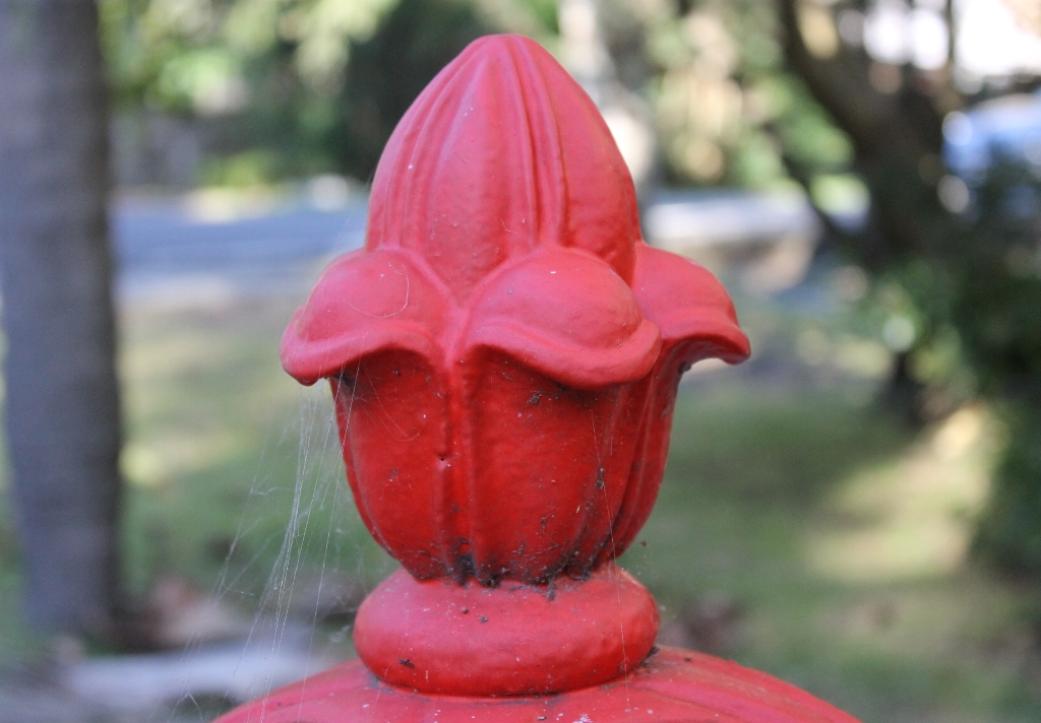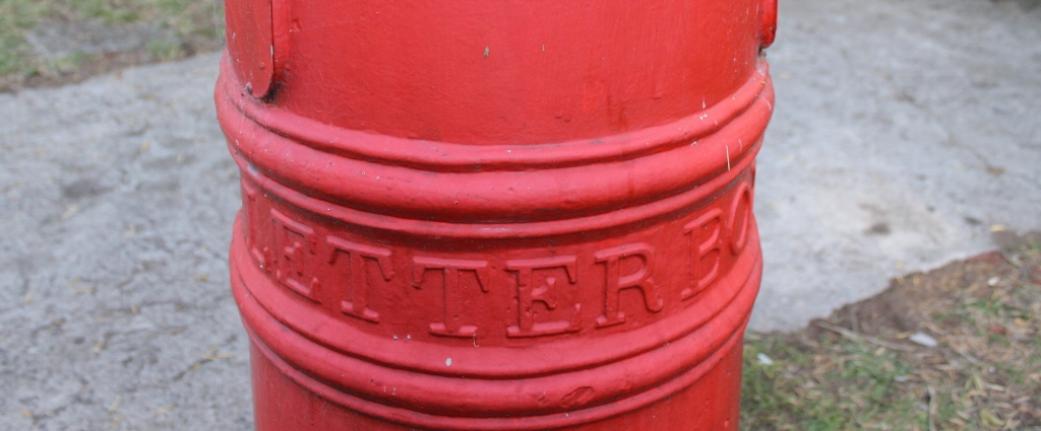April 6 - 12, 2014: Issue 157
The Mail Route to Pittwater and Beyond
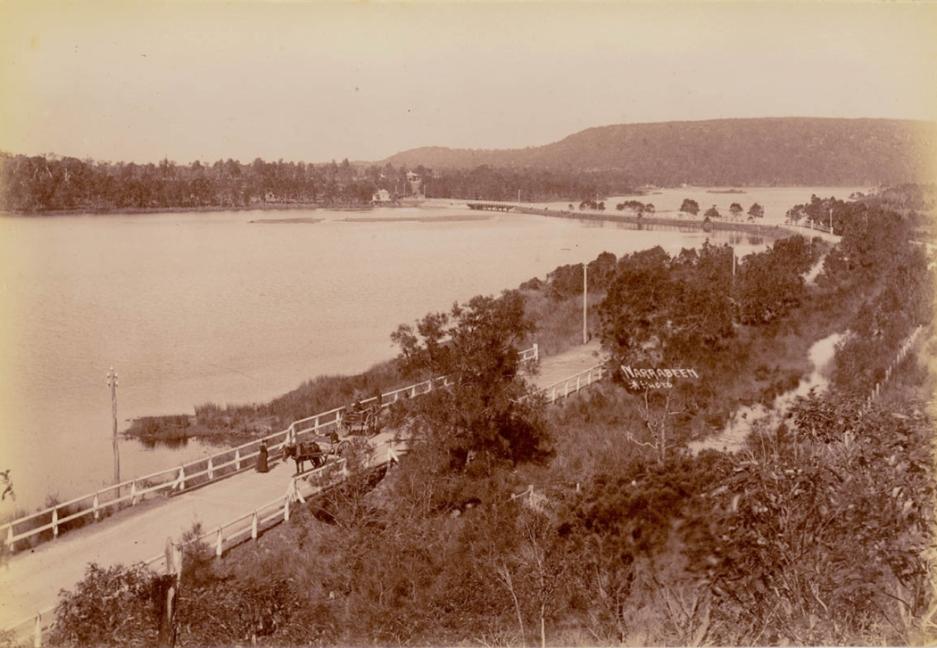
View - Narrabeen Lakes, ca. 1900-1910, Image No.:a116483 courtesy State Library of NSW.
The Mail Route to Pittwater and Beyond
The speed of communication today has seen reports this year that have hinted at trying to downsize and cut back on the days Australia Post offices may be open or delivering postal items due to an increase in emails as a preferred means of communication. Besides the obvious effects this may have on businesses this also, in a ‘three day a week’ plan harks back to how we began here in Pittwater – just a few deliveries a week – and these did not occur until the ‘colony’ had been established for almost 100 years!
How can this be so, you may ask, were we considered that far in the ‘backwaters’ when only so close to Sydney, the town – in short, yes we were. Roads headed west – to Parramatta and beyond, the food growing districts. There were few if any roads, and those that had settled here were expected to build these themselves and pay for their upkeep for quite some time.
MANLY BEACH AND PITTWATER.-A deputation, consisting of Mr. E. Hill, M.L.A., Mr. George Thornton, Mr. Wearne, Mr. Pitt, and others, had an interview with the Minister for Works (the Hon. James Byrnes) on Friday. They requested that the punt across Middle Harbour might be put in working order, and the road made from it to Manly and thence to Pitt-water. The Minister promised to obtain a report on the condition of the punt and the approaches, and as to the other matters he advised municipal incorporation. He would send an officer to report upon the nature of the country through which a road was asked, and would then submit the matter to the consideration of the Cabinet. For himself, he failed to see sufficient reason why the Government should undertake the expenditure asked, more especially as there was water-communication several times a day to Manly, and several times a week to Pittwater. The Sydney Morning Herald. (1871, October 23). The Sydney Morning Herald (NSW : 1842 - 1954), p. 4. Retrieved from http://nla.gov.au/nla.news-article28415051
PARISH ROADS.-His Excellency the Administrator of the Government, with the advice of the Executive Council, having deemed it expedient to open and make the several Parish Roads mentioned in the schedule appended hereto, to be maintained at the expense of the parishes through which they pass : Notice is hereby given, that in accordance with the provisions of the Act -4th William IV., No. 11, Plans and Books of Reference showing the intended lines of the Roads in question are now deposited at the office of the Surveyor-General in Sydney and at the Police-offices mentioned.
It is requested that any well-grounded objections that may exist to the formation of the roads in question may be transmitted in writing to the Clerk of the Executive Council within one month from this elate.
By his Excellency's command,
J. HOWIE WILSON.
Schedule referred to.
Roads No. 72-315.-Description of Road : Deviation in the road from Manly to Pittwater, county of Cumberland, in lieu of part of wall confirmed in Government Gazette of 31st May, 1861, folio 1234. Names of reputed owners or occupiers through whose properties the roads pass: R. Campbell, T. Collins, D. Rowan, J. Jenkins, E. Jenkins, and Reserve for Recreation and Camping. Police office at which the plans and books of references have been lodged; Water Police Office, Sydney. Advertising. (1872, April 17). The Sydney Morning Herald (NSW : 1842 - 1954), p. 8. Retrieved from http://nla.gov.au/nla.news-article13255895
Mail, if it didn’t come out by someone returning from ‘town’ via a horse and cart, a ferry or coaster– it didn’t come at all. There was a Telegraph established at Barrenjoey in the Customs Station in 1869, three whole years prior to a regular Mail Service for Pittwater. This Telegraph line ran from Castle Hill to Barrenjoey and a Telegraph office opened at the customs station and the Coast Waiter, Albert Thomas Black was appointed telegraphy operator.
Country and Mining News. (FROM OUR CORRESPONDENTS.)BRISBANE WATER. July 23. The event of the week has been the opening of a telegraph station at Gosford. The sudden and unexpected visit of Mr.E. C. Cracknell, superintendent of telegraphs, to Gosford, on Monday last, put the whole township in motion, as if an electric shock had been administered to the residents, who woke up, as if by magic, from their usual lethargy, when it became known that they were in instantaneous communication with Sydney and the rest of the world. Some innocents stood gazing at the wire, expecting to see the pieces of paper with the messages pass along it; others declaring that they heard the message go along like thunder and lightning; others bewailed the fate of any of the Blue Mountain parrots(at present so numerous in the district) that might have the misfortune to take a moment's rest on the wire. Well, we have got the wire at any rate, through the persevering application of Mr. Cunneen, late member for the district. From all I can learn, the line from Wallsend here has been one of the most difficult in the colony to construct. It is well for the country that the contract was in the hands of so energetic a contractor as Mr. Thomas Smith, of Maitland; many another man would have broken down under the task. The selection of a site was but the work of a very short time. No site could have been more aptly chosen than the one selected by Mr. Cracknell. The office is situated in a store and dwelling occupied by Mr. Alfred Jaques, and amidst the public offices and the principal business establishments in Gosford West. The establishment is in charge of Mr. Goodman. It may be well to mention, for the information of your very numerous readers in this district, that messages are delivered free of charge within a radius of one mile of the station; for the first mile after, a charge of 6d is made, and the charge for every mile beyond is discretionary with the stationmaster. The charge for transmitting a message to any part of the colony is 1s for the first ten words, and 2d for every additional word. I have heard that it is the intention of the Postmaster-General to extend communication by laying a cable hence through Broadwater and Broken Bay to Barrenjoey, thus facilitating the transmission of messages between Sydney, Wallsend, Newcastle and the northern districts generally. Country and Mining News. (1878, July 27). Australian Town and Country Journal (NSW : 1870 - 1907), p. 38. Retrieved from http://nla.gov.au/nla.news-article70593495
In NSW a mail system was established:
“…on April 25, 1809, Colonel Paterson, who at that time was Acting Governor of New South Wales, established the first Australian post office by a general order issued at Sydney. This stated:
On the arrival of any vessel, Mr. Nichols (naval officer), or any person properly authorised by him, is to repair on board, and to require that all letters and parcels directed for the Colony be delivered to him, for which he Is to give a receipt to the master, mate, or supercargo. An office for their reception shall be established at his house, and in consideration of the trouble and expense attendant on the duty the following sums shall be charged by him on their delivery, viz.:i For every letter, one shilling; for every parcel not exceeding twenty pounds weight, two shillings and six-pence; for all exceeding that weight, five shillings. FIRST POST OFFICE. (1934, April 26). The Mercury (Hobart, Tas. : 1860 - 1954), p. 3. Retrieved from http://nla.gov.au/nla.news-article24928928
The concept of a Royal Mail service came to Australia with the First Fleet in 1788. A postal service, operated by the government for the use of the public at a set fee, dates from the reign of Charles I, who had opened the Royal Mails to the public in 1635. This made communication across long distances affordable for all.
In the early years of the colony virtually all mail was official mail, so police and other officials handled deliveries. They unofficially carried such private mail as existed, although to send letters to England colonists normally had to make arrangements with ships' captains or their agents, who, for a fee, would agree to carry letters and then put them in the (by then regular) English or Irish posts.
Nichols was an emancipist for whom transportation to New South Wales had provided a great opportunity. He had been one of the colony's first shipbuilders and shipowners as early as 1803, and, following the Rum Rebellion, sided with the insurrectionaries, who appointed him to a number of positions including that of postmaster. Nichols served as postmaster until his death in 1819, all the while maintaining his ship owning, agricultural and other official roles as well.1
Nichols used his home on the corner of George Street and Circular Quay as Sydney's first post office. His successor, George Panton's home was not as conveniently located, so he opened the country's first post office building. Both Nichols and Panton ran the postal service as private concessionaires, keeping the profits for themselves.
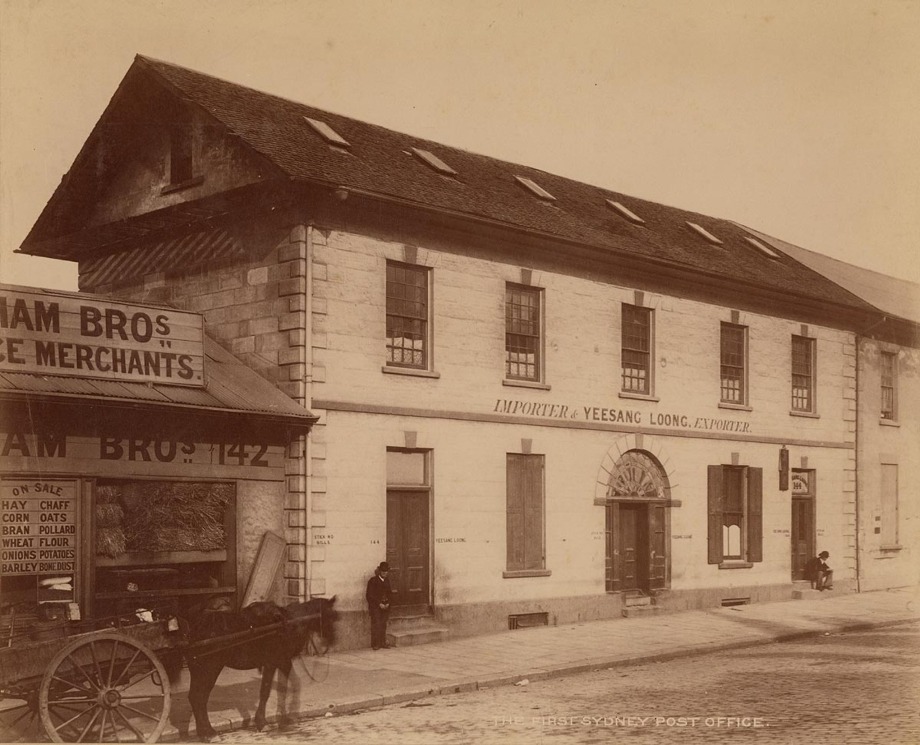
The first Sydney Post Office : The Post Office operated from the home of the first postmaster, Isaac Nichols, in lower George Street. This photograph was taken a few years before the building was demolished in 1889. Image No.: a089288, courtesy State Library of NSW
The first regular mail service, like the first regular transport service in New South Wales, was by boat along the Parramatta River between Sydney and Parramatta. In 1803 an advertised rate of twopence per letter was established for private mail between the two settlements. This marked the beginning of postal services in Australia, although deliveries in each town remained haphazard and largely dependent, it would appear, on the goodwill of the police (generally secured by a modest fee).
In 1825 the government assumed direct control of the postal service when the Legislative Council passed the first Postal Act. The postmaster was now salaried and no longer a private entrepreneur. Despite the postal service now being in government hands, many of its functions, especially transport and delivery of letters and parcels, were contracted to private individuals and companies, as it is still is today. In 1828 the colony's first letter carrier was appointed to deliver mail in Sydney, signalling the separation of letter delivery from policing. Letter carriers' equipment included a handbell, and a leather bag with two pockets: one for paid and one for unpaid letters. In 1830 the post office began to occupy the site of the present General Post Office (or GPO) in George Street, and the next year the first letter boxes appeared in Sydney's streets and postal rates within the city were cut to twopence, at which price they would remain until 1911.
Letter carriers preceded ‘postmen and women': The letter-carrier Williams, accused of Post-office robbery, died in a lunatic cell, at Darlinghurst gaol,at two o'clock on Thursday morning; from delirium tremens. MISCELLAEOUS,. (1865, February 18). Empire (Sydney, NSW : 1850 - 1875), p. 3. Retrieved from http://nla.gov.au/nla.news-article60566158
THE POST OFFICE. SIXTEENTH ANNUAL REPORT on the Post Office Department, being that for the Year 1870. General Post Office, Sydney, 16th May, 1871. My Lord,-I have the honour to transmit, for the information of your Excellency, the sixteenth Annual Report on the Post Office Department, being that for the year 1870.
INLAND SERVICE
Year 1869-Extent of postal route on 31st December, 13,238 miles , number of miles travelled, 2,879 659 , cost of conveyance of mails, £50, 159 17s 8d , average cost per mile, 4d 1-0 , number of post offices, 621 Year 1870. Extent of postal route on 31st December, 14,242 miles, number of miles travelled, 3,062,458, cost of conveyance of mails, £48, 648 11s 10d , average cost per mile, 3d 5-6, number of post offices 562.
In the appendix will be found returns showing the length of new lines during 1870 to be 1136 miles, and the length of post lines abolished during tho same period to be 132 miles,-tho actual increase in the postal route in the year 1870, as compared with that of the year 1869, being 1039 miles, as shown m the above return A statement of the increased communication on existing lines will be found in the appendix. The extent of postal lines by horse, stage, and rail may be stated as follows: horse .. .. ,. 10,038 Stage . .. 3, 865, Rail .. .. .. 339 Total .. 14,242 miles.
THE POST OFFICE. (1871, June 19). The Sydney Morning Herald (NSW : 1842 - 1954), p. 2. Retrieved from http://nla.gov.au/nla.news-article13240497
The establishment of a mail service to Pittwater began by the presentation of a petition signed by those who lived here. As early as May 1871 Mr. Black of the Customs Station offered to take on the duties as Postmaster at Barrenjoey. (see Letter below):
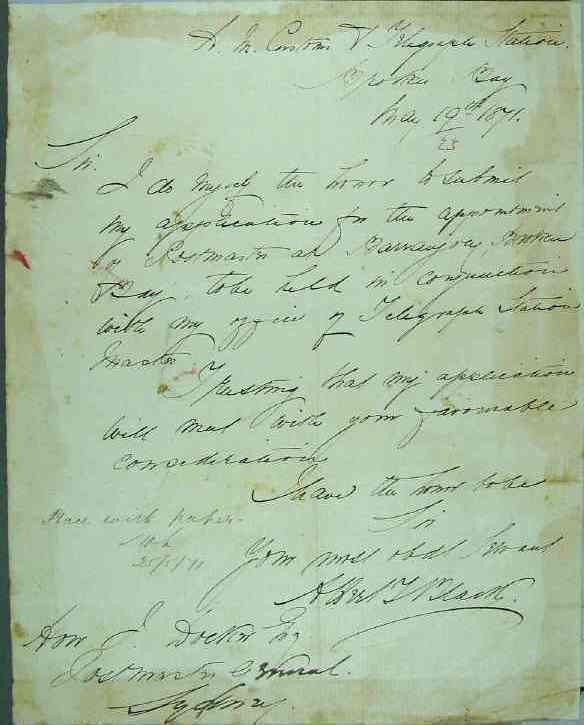
And was appointed August 4th, 1871:
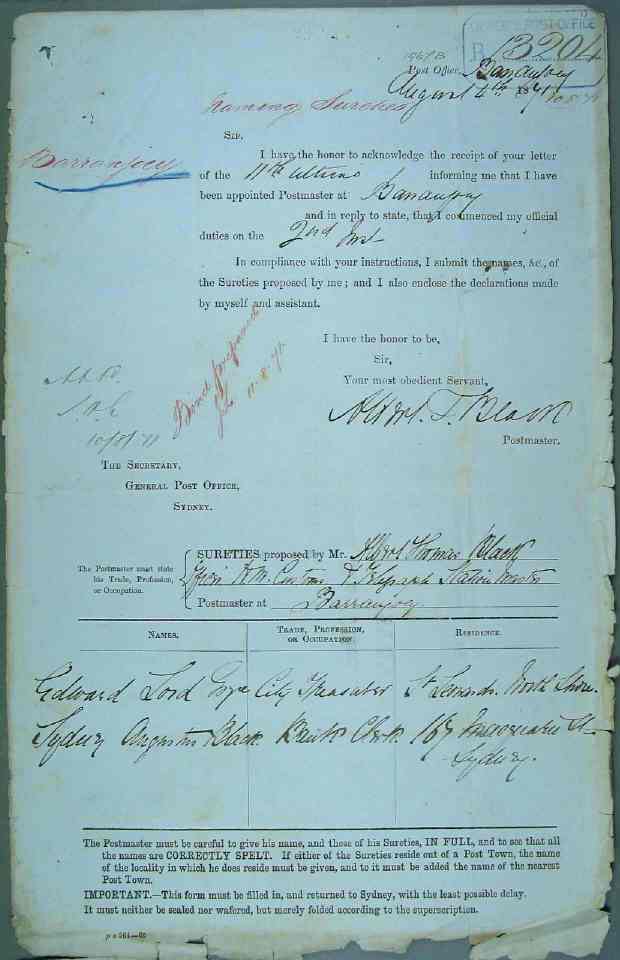
On 23 August 1870 many of the residents between Barrenjoey and Manly signed this letter we found in the Australian Archives, a petition for a biweekly mail service between Manly and Barranjoey. The petition was presented on 15 November 1870 by Mr Black of H.M. Customs and Telegraph Station, Broken Bay.
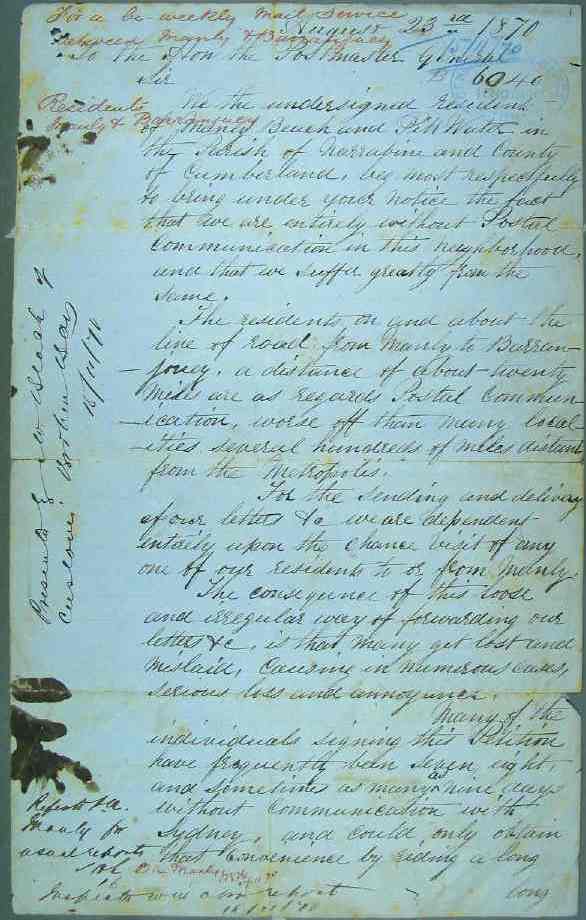
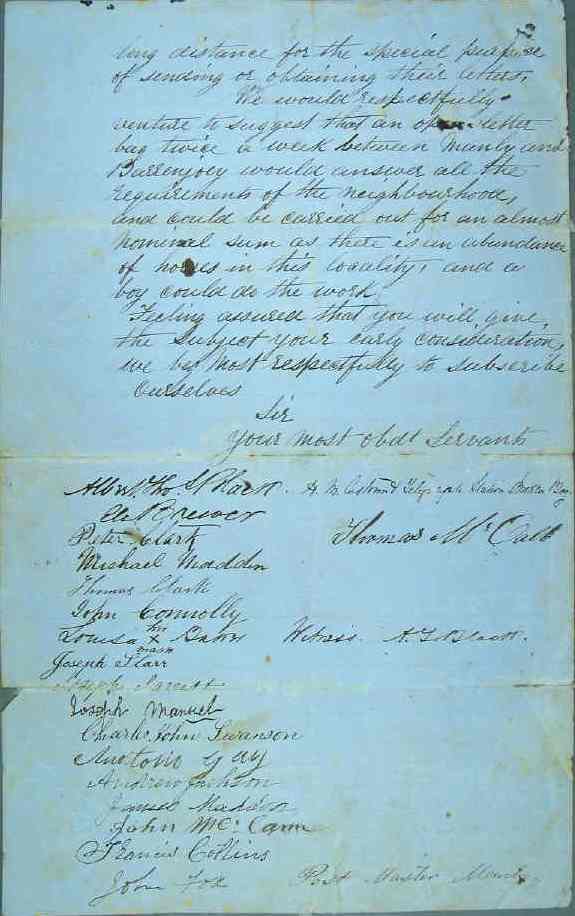
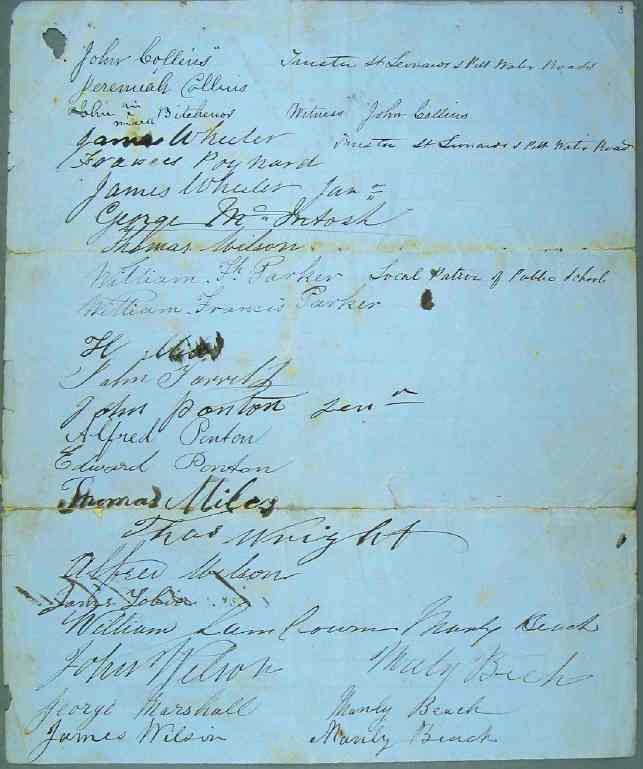
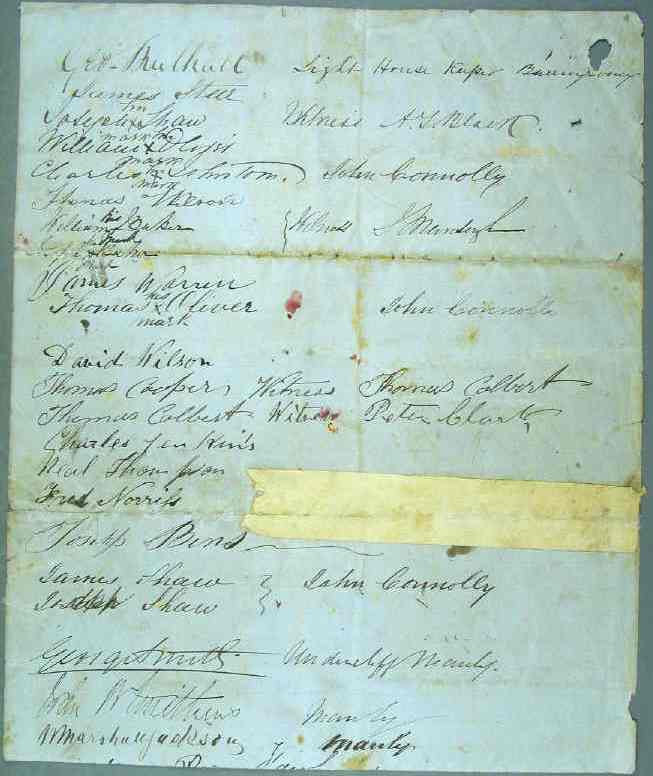
A Post Office now established at Barranjoey, advertisements for Tenders for an overland route then appeared. From the documents we have read this service was never going to be profitable but had to be provided:
CONVEYANCE OF MAILS.-TENDERS for the conveyance of the undermentioned Mails will be received up to 11 a.m. on TUESDAY, the 10th October next. The tenders must be addressed to the Secretary to the Post Office, Sydney, and endorsed, " Tender for the Conveyance of Mails." For full particulars see GOVERNMENT GAZETTE, a file of which is kept at every Post-office in the colony. No tender will be considered unless the terms of the notice published in the GAZETTE be strictly complied with.
NORTHERN ROAD.
1. Manly and Barrenjoey, via Brady's, Jenkins's, Wilson's, and Collins', once a week. GOVERNMENT RAILWAYS. (1871, August 19). The Sydney Morning Herald (NSW : 1842 - 1954), p. 2. Retrieved from http://nla.gov.au/nla.news-article13243411
And was won by:
General Post Office. Sydney, 13th October, 1871. ACCEPTED TENDERS.-It is hereby notified, that the following Tenders for the Conveyance of Mails, from the 1st January next, have been accepted. Manly and Barrenjoey, via Brady's, Jenkins's, Wilson's, and Collins', once a week- J. Collins, horseback, 3 years, £32 per annum. Advertising. (1871, October 14). Empire (Sydney, NSW : 1850 - 1875), p. 1. Retrieved from http://nla.gov.au/nla.news-article60877114
John Thomas Collins again won the contract when it came up for Tender again:
GOVERNMENT MAIL NOTICES. General Post Office, Sydney, 29th October, 1874. IT is hereby notified, that the following Tenders for the Conveyance of Mails from 1st January next, have been accepted. Manly and Barrenjoey, via Brady's, Jenkins', Wilson's, and Collins', once a week-John Collins, horseback, 3 years, £32 per annum . Advertising. (1874, October 30). The Sydney Morning Herald(NSW : 1842 - 1954), p. 6. Retrieved from http://nla.gov.au/nla.news-article13342493
It was just after this period that Newport Hotel was being built, also the wharf at Newport that would bring thousands of excursionists to Pittwater year round. Charles Jeanneret, a ferry boat king of this era, along with George Pile, a real estate king, were the builders. Their eyes on Pittwater, and creating it as a ‘premier resort’ with the centre being Newport, led to a proposal that precipitated one of those word skirmishes that is still alluded to, even though those who were in the thick of it are now resting in peace. This account also reminds us that the Hawkesbury was one of our 'roads' and that communication with the Central Coast was frequent and fast, as has been reinstated in recent years by Peter Verrills and the then Palm Beach Ferry Company:
BRISBANE WATER. (FROM A CORRESPONDNENT.) GOSFORD WATER, MARCH 30. The notice in the Gazette, calling for tenders for the conveyance of mails between Sydney and Gosford, via Pittwater and Manly, has been read with feelings of great satisfaction by the inhabitants of the Brisbane Water District. This route has long been advocated by every one interested in the well-being of the district, but the uncertainty of the action of the Post Office authorities, and even more the want of proper organization, has hitherto prevented any active steps being taken to carry out the matter Irrespective of the benefit to the passenger traffic of Gosford (which I will notice below), we shall obtain a tri-weekly mail at very little, if any more expense than the present bi-weekly one costs. We shall have the mails taken from Sydney to Gosford in six hours at most, instead of in nearly twenty-four hours as at present by the overland mail route, and a coach mail instituted over a good road, instead of one on horseback, over an extremely mountainous track. The present passenger route by sea, (although accepted as better than none) is open to very serious objections. It is evident that often when mails and passengers would be prevented by the sea route the land route via Pittwater and Manly would be practicable. It may be urged that the bar at the mouth of the Brisbane Water could not be at all times crossable, but as there is an additional overland route from the vicinity of Mullet Wand which could be adopted at such times no detention of the mails need take place the facilities offered by the proposed mull coach route to those "on pleasure bent" must also be taken into consideration, for the grand and picturesque scenery of the Hawkesbury, at present only accessible to the fortunate few able to join organized expeditions, will thus be placed within the reach of hundreds desirous of enjoying a week's boating and fishing, or of enriching their sketchbooks with the lovely " bitV' so dear to the artistic mind to gum this enjoyment without the disagreeable concomitant of sea sickness and possible detention of some days, by the advent of a "southerly buster," is alone cause sufficient to draw down fervent blessings on the heads of the postal authorities, and I have no doubt the memory of these worthy magnates will be duly honoured by the picnicers of the future, enjoying their Christmas or Easter holidays on the banks of the far-famed Hawkesbury
Material advantages would follow to the inhabitants about Pittwater. An increase in the number of tourists would necessitate increased accommodation. An inn would soon be built, boats and horses provided for the use of visitors, and Pittwater would develop into a thriving township , nor would Gosford fail to participate in these benefits in addition to the very important boon of a tri-weekly mail Thus we see that the proposed route posses as many advantages for passengers over the present tardy and dangerous conveyance by sea. Speedy and regular transit is insured, a tri-weekly mail is corned at very little expense additional to that of the present bi-weekly service, and the beautiful district around Brisbane Water opened up to the health and pleasure seeking community of the metropolis. BRISBANE WATER. (1879, April 7). The Sydney Morning Herald (NSW : 1842 - 1954), p. 3. Retrieved from http://nla.gov.au/nla.news-article13432277
It was necessary, due to the high costs of running these ferries, to try and attract the tourist trade as well, and this aspect was continually reiterated by those in the newspapers:
THE means of communication between Sydney and Gosford, the Lakes, Pittwater, and the Hawkesbury, will now, it appears, be made more satisfactory to those who desire to visit these picturesque districts. Hitherto bi-weekly communication has been maintained by the steamer Pelican, plying to Barranjouie, at the entrance of the Hawkesbury, and from thence across the bay to Brisbane Waters., which is entered over a bar by a narrow tortuous channel with only four feet of water at low tide. Across this bar the sea breaks very heavily when there is a southerly swell. From the peculiar nature of the place, it is considered unsafe, except in very fine weather, for vessels, except those of very light draught and possessing good steering qualities, is enter there and it has been found that excursionists and others' object, except as a matter of necessity, to take the sea trip of about twenty miles from Sydney Heads in steamers of a small class. To meet this difficulty, and in the hope that during the ensuing-season a considerable number of person may be induced to visit the Hawkesbury, the owner of the Parramatta River and Brisbane Water line of steamers has had a steamer of great speed and comfortable accommodation built recently by Dunn and Co., of Lavender Bay. This steamer is named the Osprey, and she has been sent to the Hawkesbury, where she will remain if the inducements offered during the ensuing season prove sufficient. Passengers to and from Sydney will be conveyed by Mr. Fraser, of Manly, by Vehicle, from Manly Pier, at 8 a.m., on Tuesdays and Fridays, to Pittwater. The Osprey will take them down the Pittwater estuary to Barranjouie, where they will be transferred to the Pelican, which will arrive there at the same time from Sydney. The Pelican will go across the bay and bar to Gosford, and return after a few hours delay at Brisbane Water, and meet the Osprey again at Barranjouie, where the passengers who prefer the lake and land to the ocean trip will have an opportunity of transhipping and arriving at Manly about dark. If the road is improved with the money voted by Parliament for the purpose, there is no reason why the conveyance, should not catch the 5.30 steamer from Manly. This would then be one of the most enjoyable trips that could be imagined; but, if this is not done, it will involve a night's lodging at Manly or a special conveyance to Sydney. While the Pelican is going from Barranjouie to Gosford and returning, the Osprey will make a trip, if inducement offer, about twenty-five miles up the Hawkesbury, and occasionally go all the way to Windsor, leaving the Pelican to fill her place in taking overlanders from Barranjouie to Pitt Water. It is to be hoped that the enterprise of the owner of this line of steamers, in putting on such a fine steamer as the Osprey, will be appreciated, and that the good beginning thus made may lead to the further development of the beauties and resources of Brisbane Water and its surroundings. NEWS OF THE DAY. (1879, July 14). The Sydney Morning Herald (NSW : 1842 - 1954), p. 5. Retrieved from http://nla.gov.au/nla.news-article13438428
Opening of the New Overland Route from Gosford to Sydney.
(From a correspondent.)
The new overland route from Gosford to Sydney, via Pittwater and Manly Beach, was opened on Saturday morning last, the 2nd instant, with great éclat ; that being the first occasion when the Brisbane Water mails were (under the new mail contract) forwarded from Gosford to the metropolis, according to the recent much improved and much desiderated postal arrangements. The royal mail steamer " Florrie," a very beautiful swift and commodious little screw steamer-just built (by Mr. Rock Davis, in his own shipyard at Blackwall, in the Broadwater) expressly for this service-left the steamers wharf in West Gosford, at contract time, exactly at eight o'clock ; a considerable number of the principal inhabitants of Gosford being on board, all eager to do honor to a truly auspicious occasion, the inauguration of a new and better era for our vast, lovely, and salubrious (but hitherto lamentably isolated) district. Owing to the very short notice that could, under the circumstances, be given, many agreeable and respected persons, who would, doubtless, have been most happy to have taken part in the proceedings, did not manage at the above-named early hour, to put in an appearance; awaiting, perhaps, the formality of written or verbal invitations, such as could not possibly be dispensed to all. The excursionists-exclusive of the actual overland passengers amounted, however, to between thirty and forty individuals ; and a joyous and exultant party it was, delighted beyond measure to see the long promised, long delayed route so spiritedly and so satisfactorily carried out, by the energy and enterprise of the mail con-tractor, Mr. Rock Davis-realized as a cheering solid fact, in the very teeth of the open and covert opposition of many interested and influential parties, with much other vexatious hindrance. Blessed as Brisbane Water now is-in addition to the grand advantage of telegraphic communication-with this new and expeditious postal route, via Pittwater and Manly, available for passengers in all weathers, and capable of uninterruptedly carrying travellers, newspapers, and letters from Gosford to Sydney or back, in less than five hours, (without exposure to any of the manifold miseries, risks, and delays of the sea-voyage) our district now only requires its principal roads to be placed by a wise and discriminating Government, on a higher and more suitable classification, and so be at length enabled to ensure its fair amount of prosperity and progress ; a progress that must continuously in-crease, until the prompt construction of the promised railroad (inevitably destined to join the " Great Northern" trunk line to that of the " Great Western") shall-incidentally, as it were, laying open our grand, primæval forests-connect us with Sydney and with Maitland, and place us, once and for all, on a level with the more favoured inhabitants of other districts.
The " Florrie" having started, at full speed, at eight o'clock a.m., reached Black-wall (at the southern extreme of the widest part of the lovely broadwater of Gosford) in rather better than half an hour, and there she took in the Blackwall mail, with some more passengers; after which she proceeded rapidly down the stream, by Hardy's Bay, and across the large, lake-like expanse beyond it, in the direction of Mulhall's Point, and the Bar ; passing through that seaward portal of the lonely district out into Broken Bay, at a pace which fully proved the capabilities of the trim little craft for her destined purpose. The mail steamer was found by her passengers to be swift but steady, being furnished everywhere, and in every respect, with a studious regard to the personal comfort of all. In the bay there happened to be a very heavy rolling ground swell, yet the " Florrie " swept over it all, though more like a quick little seabird than a lumbering pelican: her rapid motion being barely perceptible, because she is not worked by paddle-wheels, but by a screw at her stern of the latest design and best construction. The smart little steamer in a very few moments flew across Cook's broad Broken Bay, a little to the eastward of Mount Elliott; paused for a brief space off the Sub-collector's station in the Bight of Barrenjuey, and then ran directly and pleasantly south-ward, over the smooth, still, landlocked depths of Pittwater-past Careen Bay to the left, and past the " Basin" and Scotland Island to the right-until she halted at the jetty, at the head of the long and picturesque inlet at Pittwater, at half-past 10 o'clock, having come along leisurely from Gosford wharf (including all stoppages) in two hours and a half. Here the excursionists, who were going no further, and who had evidently enjoyed the trip amazingly, and were in a high state of delight with the everchanging scenery-all landed; and, having formed a hasty camp, they dined together al fresco under the trees.
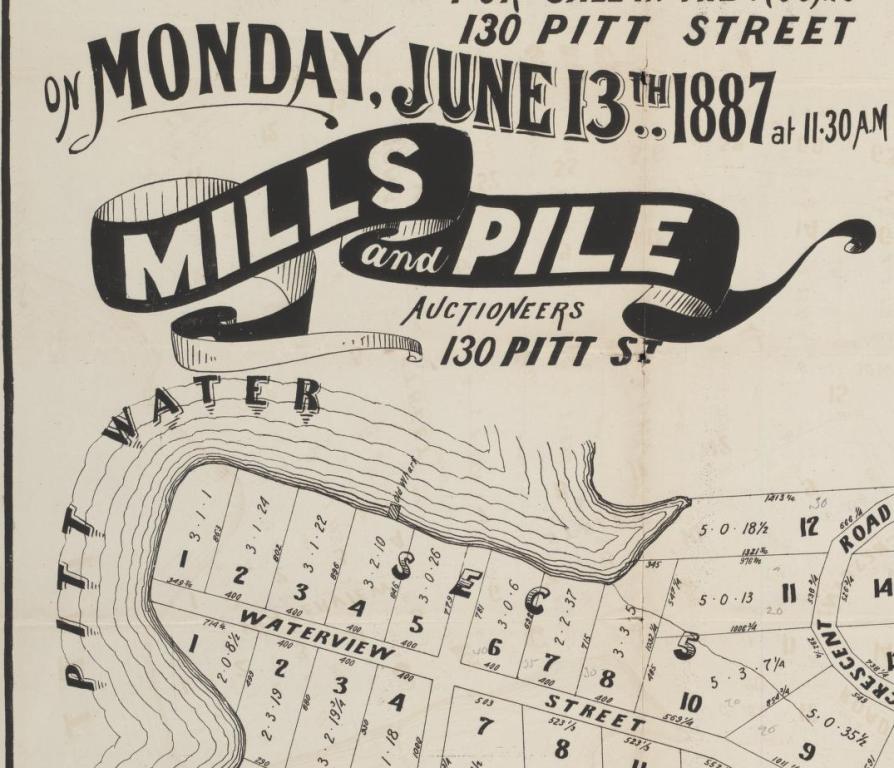
Old Wharf shown on Mona Vale, Pitt Water [i.e. Pittwater] [cartographic material] / for sale in the rooms, 130 Pitt Street on Monday June 13th 1887 at 11.30 a.m., Mills and Pile, auctioneers, 130 Pitt St. MAP Folder 103, LFSP 1553. Courtesy National Library of Australia.
The coach came down to the end of the jetty precisely at eleven o'clock, and after having been duly and heartily approved of by the Gosfordites, was depatched back again in due course to her destination -Manly Beach. The coach proved to be a fine four-wheeled waggonette, provided with a high, fixed leathern hood, and drawn by two horses ; everything about this coach, as on the steamer, was perfectly new. The experienced driver is Mr. Bolton, whose hospitable roof has often sheltered disappointed, weary, and sea-sick travellers, when the sea-going steamer has had to put back with them into Pittwater in bad weather, and stern necessity has compelled them to face a long night's journey overland to Manly afterwards, through the darkness and rain. The trap to carry the mail and passengers is a smart and stylish turn-out, painted red and black; and it was found-by some critical jago of the party, who must needs know everything-to have come all the way from the Manly post office that morning in one hour and three-quarters. It would seem, therefore, that there is really nothing whatever to prevent letters sent from Gosford to the Metropolis by this route from being distributed in Sydney by the four o'clock delivery on the very same day. Comment on the magnitude of this improvement must be quite superfluous.
The excusionists stayed at Pittwater for about an hour and a half, and having then gone on board, the "Florrie" returned with them and the Sydney mail, and the party were landed at the Gosford Wharf, in high spirits, a few minutes after two o'clock p.m. On the return of the " Florrie " through the " bar " her good qualities were strongly and successfully tested. It was dead low tide, only four feet and a half of water, and yet the vessel came through flying. If she had been as big as her sea-going rival she must have turned back and have waited outside on the rolling billows till the tide served. What the very potent and disturbing results, to most stomachs, of such waiting and see-sawing, let those who have had due and painful experience solemnly and emphatically explain.
Before the excursionists left the " Florrie," the Police Magistrate, Mr. Edward Reeve, addressed a few remarks to those present, congratulating them all on the happy and auspicious inauguration of the new overland route to Sydney, via Pittwater and Manly. He briefly pointed out to them some of the many striking advantages thereby secured to the district and to the public at large ; and he expressed his ardent hope that the opening of this route might be to them an earnest of still greater progress. ln the courts of his observations Mr. Reeve paid a warm and well merited compliment to his friend, Mr. Rock Davis, by whose persevering energy and liberal enterprise the outer gates of their district were thus for ever un-barred, and an immense and permanent alteration secured for more expeditious and pleasant travelling between Gosford and Sydney, together with a greatly improved means afforded for the reception and despatch of letters and newspapers. At the close of the Police Magistrate's remarks three hearty cheers were given for the " Florrie" and for Mr. Rock Davis.
The day was a lovely one, and the magnificent lake scenery was everywhere seen to the very best advantage. It appears to be quite certain-now that, in spite of interested opposition, flippant imbecility, and pure Rip-Van-Winkleism, this route is happily established-that a large number of excursionists may constantly be expected down this way from Sydney to visit the far-famed Hawkesbury and the little-known Brisbane Water district. These will have to leave the Circular Quay for Manly Beach in the steamer with the mails at seven a.m. ; and they can thus arrive at Gosford at about 2 p.m. This route is open (for the present) only on Thursdays and Saturdays, but it will, doubt-less, soon be in active use daily. The " new overland" will doubtless be the favorite route by which all foreign visitors to the Sydney Exhibition will come down in search for the picturesque at the Hawkesbury and at Brisbane Water. Gosford, 5th August. Opening of the New Overland Route from Gosford to Sydney. (1879, August 9). The Maitland Mercury and Hunter River General Advertiser (NSW : 1843 - 1893), p. 12 (Second Sheet of the Maitland Mercury). Retrieved from http://nla.gov.au/nla.news-article18931762
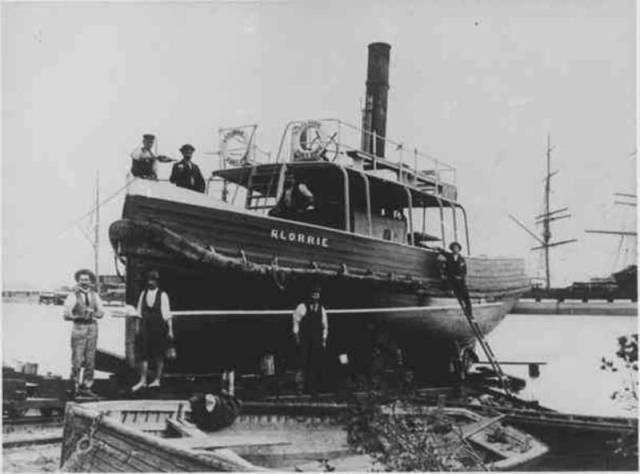 The NEW MAIL SERVICE to BRISBANE WATER. (FROM OUR OWN CORRESPONDENT.) GOSFORD, AUG. 2. In spite of the influence vigorously exercised against
it, we have got our mail route established via Pittwater and Manly, and
residents whose business necessitates their frequently visiting Sydney, are now
secured a quick, certain, and pleasant transit, in place of the tedious,
doubtful, and disagreeable voyage by steamer or sailing vessel-or dangerous
journey overland to the westward via Peate's Ferry. On the manifest advantages
of the route via Pittwater and Manly to the district it is unnecessary to dwell,
for a glance at the map must surely be quite sufficient to show how greatly
superior to any other route, avoiding as it does vexatious uncertainties, and
petty miseries which have effectually deterred people in the metropolis, and
even Manly, from paying us a visit. Of the magnificent mountain and lake
scenery, and the salubrity of the climate of the district, much has already been
published through the columns of your journal. Through the rugged and
mountainous nature of the country on this side the Hawkesbury, we are almost
isolated. For years and years the mail arrangements have been a source of
annoyance and inconvenience to the residents. But, it must be confessed,
that the postal authorities were almost powerless to remedy the evil. Indeed, I
believe the mails to and from and the mail arrangements with, this district,
gave more trouble at the General Post Office than the mail arrangements with the
United Kingdom. Mr. Rock Davis, to whose energy and indomitable
perseverance the residents owe much to meet the growing wants of the district,
has built a suitable passenger steamer to run between Gosford and the head of
Pittwater and back, the passengers being conveyed overland between the head of
Pittwater, either way, by well-horsed coaches, so as to insure such a timely
arrival and departure as will exactly accord with the arrival and departure of
the Manly Beach steamers between Manly and Sydney. Mr. Davis has obtained
the mail contract, and his name is a sufficient guarantee that it will be
faithfully executed. The Florie made her first trip on Saturday last, in charge
of Captain William Bogan, late of the s.s. Gosford Packet, and who has been all
his life on the river, and knows everyinch of the ground. Starting from the
Gosford wharf at 8a.m., with about 30 of the residents on board, the Florie
steamed down the river, touched at Blackwall, crossed Broken Bay, and arrived at
the head of Pittwater at 10.30. The coach started immediately for Manly,
and the mails should arrive in Sydney in time for the 4 o'clock delivery, a
great improvement on the old route, to travel over which took 19½
hours. The only possible
obstacle to the realisation of this route will be the state of the road between
the head of Pittwater and Manly. It is to be hoped that no difficulties of
an insuperable character will be allowed to arise. Much has been done by the
Government and the municipality of Manly for the repair or that road. Much of
the road has been made excellent by the municipality of Manly, and it is only
some portion of the northern extremity of that road(for which money is
understood to have been voted by Parliament) remains to be made all that could
be wished. It is to be hoped that the
trade of the district will be such as to enable the owners to keep the Pelican
running. Mr. Jeanneret deserves the thanks
of the residents, for he has kept his boat on the line, frequently making
considerable loss on her trips. The NEW MAIL SERVICE to BRISBANE WATER. (1879, August
5). The Sydney Morning Herald (NSW : 1842 - 1954), p. 7. Retrieved from http://nla.gov.au/nla.news-article13443869
The NEW MAIL SERVICE to BRISBANE WATER. (FROM OUR OWN CORRESPONDENT.) GOSFORD, AUG. 2. In spite of the influence vigorously exercised against
it, we have got our mail route established via Pittwater and Manly, and
residents whose business necessitates their frequently visiting Sydney, are now
secured a quick, certain, and pleasant transit, in place of the tedious,
doubtful, and disagreeable voyage by steamer or sailing vessel-or dangerous
journey overland to the westward via Peate's Ferry. On the manifest advantages
of the route via Pittwater and Manly to the district it is unnecessary to dwell,
for a glance at the map must surely be quite sufficient to show how greatly
superior to any other route, avoiding as it does vexatious uncertainties, and
petty miseries which have effectually deterred people in the metropolis, and
even Manly, from paying us a visit. Of the magnificent mountain and lake
scenery, and the salubrity of the climate of the district, much has already been
published through the columns of your journal. Through the rugged and
mountainous nature of the country on this side the Hawkesbury, we are almost
isolated. For years and years the mail arrangements have been a source of
annoyance and inconvenience to the residents. But, it must be confessed,
that the postal authorities were almost powerless to remedy the evil. Indeed, I
believe the mails to and from and the mail arrangements with, this district,
gave more trouble at the General Post Office than the mail arrangements with the
United Kingdom. Mr. Rock Davis, to whose energy and indomitable
perseverance the residents owe much to meet the growing wants of the district,
has built a suitable passenger steamer to run between Gosford and the head of
Pittwater and back, the passengers being conveyed overland between the head of
Pittwater, either way, by well-horsed coaches, so as to insure such a timely
arrival and departure as will exactly accord with the arrival and departure of
the Manly Beach steamers between Manly and Sydney. Mr. Davis has obtained
the mail contract, and his name is a sufficient guarantee that it will be
faithfully executed. The Florie made her first trip on Saturday last, in charge
of Captain William Bogan, late of the s.s. Gosford Packet, and who has been all
his life on the river, and knows everyinch of the ground. Starting from the
Gosford wharf at 8a.m., with about 30 of the residents on board, the Florie
steamed down the river, touched at Blackwall, crossed Broken Bay, and arrived at
the head of Pittwater at 10.30. The coach started immediately for Manly,
and the mails should arrive in Sydney in time for the 4 o'clock delivery, a
great improvement on the old route, to travel over which took 19½
hours. The only possible
obstacle to the realisation of this route will be the state of the road between
the head of Pittwater and Manly. It is to be hoped that no difficulties of
an insuperable character will be allowed to arise. Much has been done by the
Government and the municipality of Manly for the repair or that road. Much of
the road has been made excellent by the municipality of Manly, and it is only
some portion of the northern extremity of that road(for which money is
understood to have been voted by Parliament) remains to be made all that could
be wished. It is to be hoped that the
trade of the district will be such as to enable the owners to keep the Pelican
running. Mr. Jeanneret deserves the thanks
of the residents, for he has kept his boat on the line, frequently making
considerable loss on her trips. The NEW MAIL SERVICE to BRISBANE WATER. (1879, August
5). The Sydney Morning Herald (NSW : 1842 - 1954), p. 7. Retrieved from http://nla.gov.au/nla.news-article13443869
There were a few diverging interests involved here. Rock Davis, despite building the vessel that would help create and maintain the Mails Service to Pittwater and Gosford, and initially winning the tender to do so, seemed happy to return to his shipbuilding – and was prolific at this. He sold the Florrie almost immediately to Jeanerett.
In 1879 Charles was proposing to take over the Mail Service on total, and was backed up by some powerful friends, including among these documents is a letter from Mr Black, Customs waiter, recommending that Collin's contract could be cancelled and that others may do the work better. J T Collins, after a few letters requesting he be so good as to furnish a reply as to whether he would surrender the Mail Contract answered in the negative:
Mr Black's Letter + 'be so good as to':
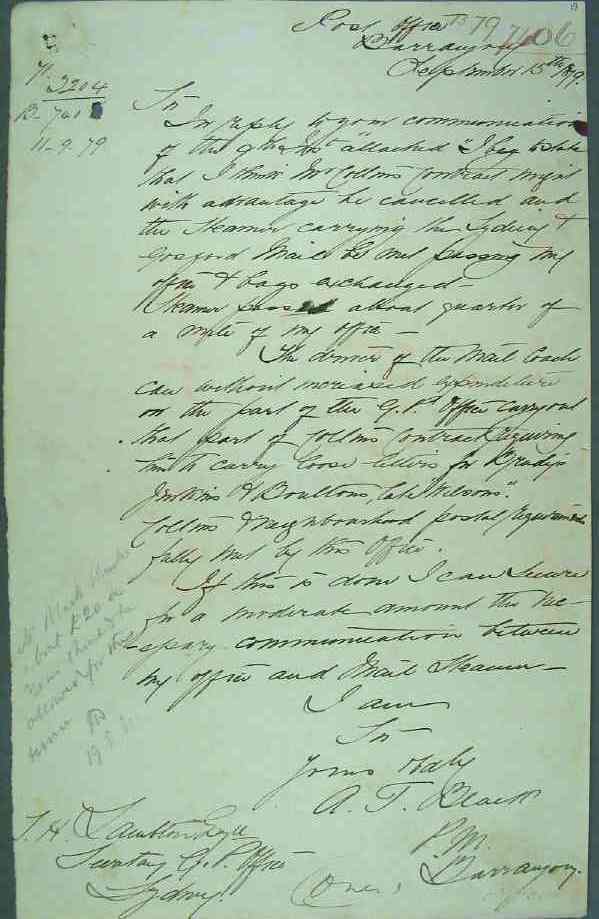
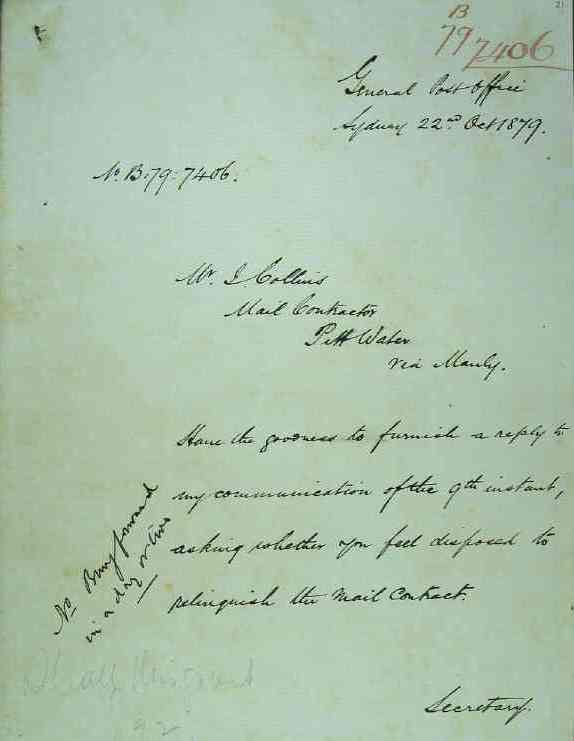
Mr Collins reply to Post Master:
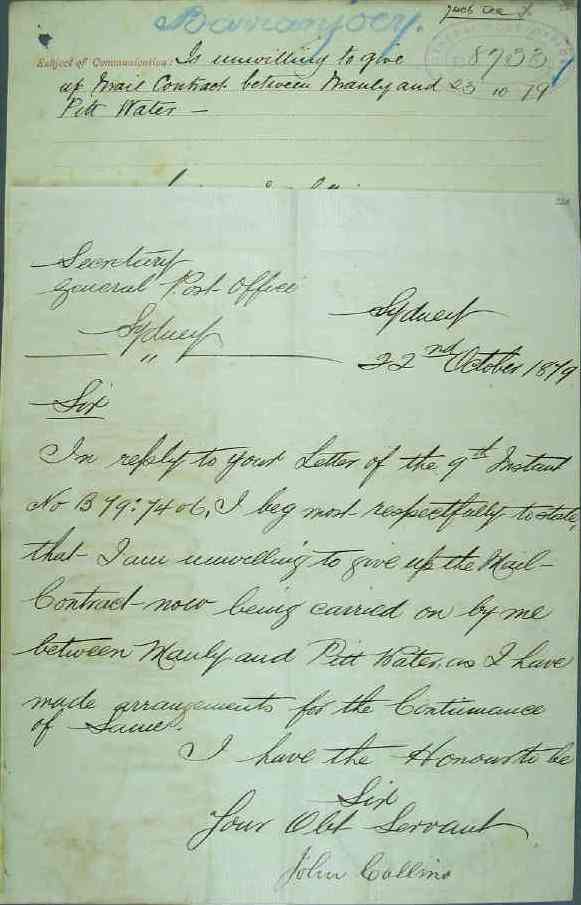
PITTWATER. The Royal Mail S.S. "FLORRIE, under contract with her Majesty’s Government, will run as follows, commencing on SATURDAY, 2nd August. 1879:-From Gosford Wharf, on THURSDAYS and SATURDAY'S, at 8 a.m., touching at Blackwall, and arrives at the head of Pittwater, at about 11 a.m.; from Brisbane Water, passengers will be conveyed by waggonette leaving Pittwater immediately after the arrival of the Mail steamer from Gosford; and passengers from Sydney will be conveyed by waggonette leaving Post-office, Manly, at 8.20 a.m. for Pittwater, and thence by Mail steamer to Brisbane Water. The steamer conveying the Mails from Sydney leaves Circular Quay at 7 a.m. ROCK DAVIS. Advertising. (1879, August 2). The Sydney Morning Herald(NSW : 1842 - 1954), p. 1. Retrieved from http://nla.gov.au/nla.news-article13448783
STEAM To HAWKESBURY RIVER PERSONS desiring to see the BEAUTIES OF THIS RIVER will have an opportunity of doing so on TUESDAY next, by the steamer PELICAN leaving King-street at 7 .30am, and joining the Florrie at Barrenjuee Or by Manly steamer from Circular Quav at 7 15, and overland to Pittwater If booked on the previous day. The Steamer FLORRIE will proceed to WISEMANS FERRY fifty miles up the river, where good Hotel accommodation can be had. Early on WEDNESDAY MORNING she will proceed on TOWARDS WINDSOR for a considerable distance and then return to Pittwater in time to take coach to catch last Manly steamer. Fares-20s return coach -4s each way. C E. JEANNERET. King-street Wharf. Advertising. (1879, November 7). The Sydney Morning Herald(NSW : 1842 - 1954), p. 1. Retrieved from http://nla.gov.au/nla.news-article13445918
John Thomas Collins (b.about 1852), eldest son of Thomas and Lavinia Collins of ‘Narabean’, had married Sarah Ann Collins of the Farrell family. They had one daughter born in 1880.
John T Collins, of Collins Retreat, and also a store in Manly, became a lessee of the new Newport Hotel and was also looking to expand his business ‘retreat’ around the corner. In September 1880 he was of several signatories requesting a Post Office be opened at Newport:
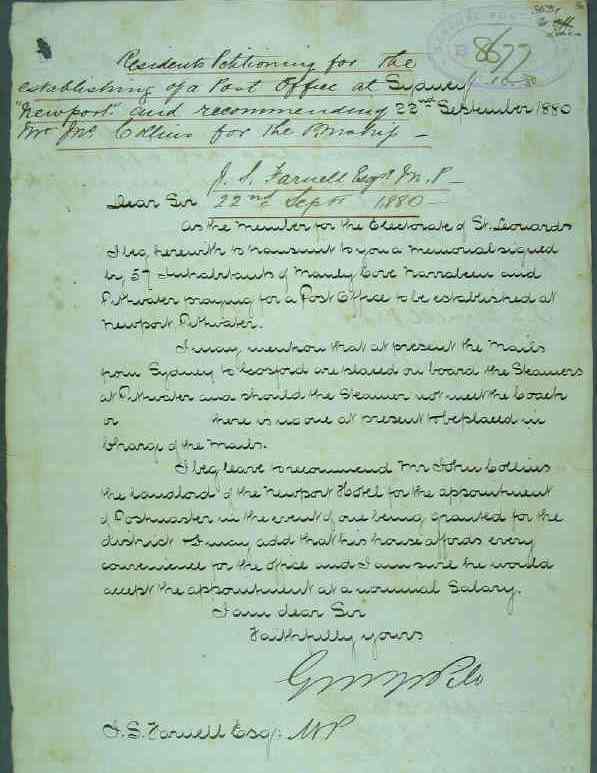
Back of this letter:
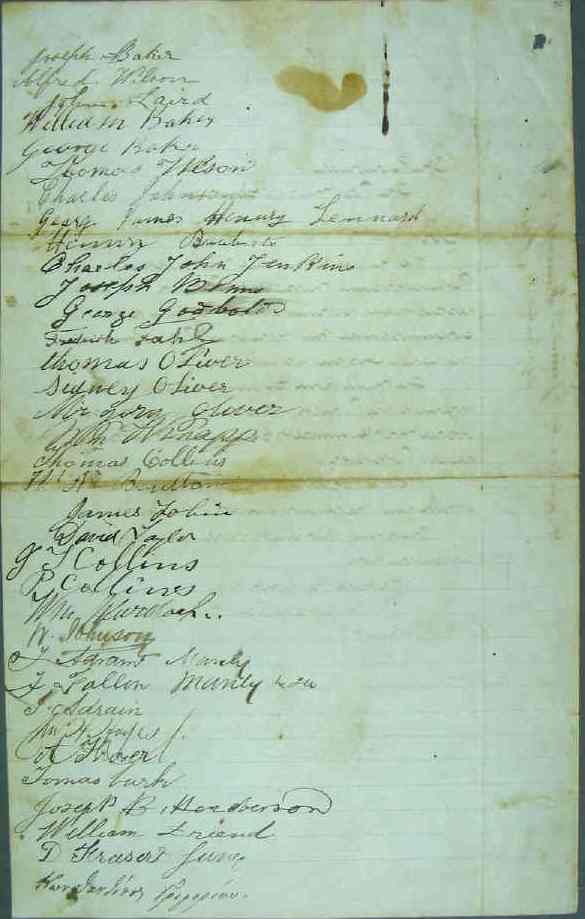
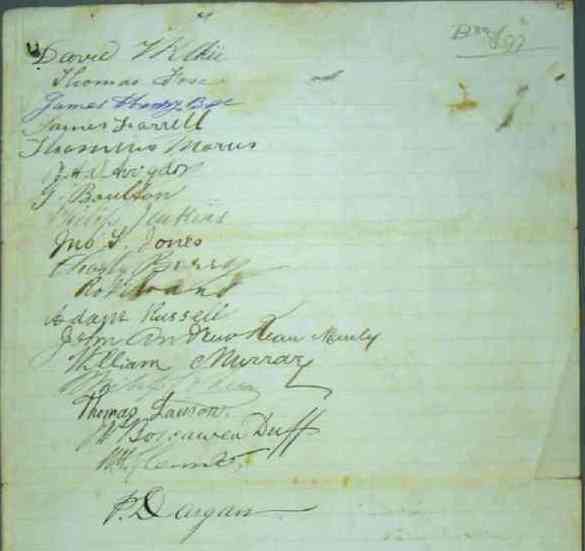
Followed almost immediately by an application by J Collins for a Post Office at Newport with himself as proprietor:
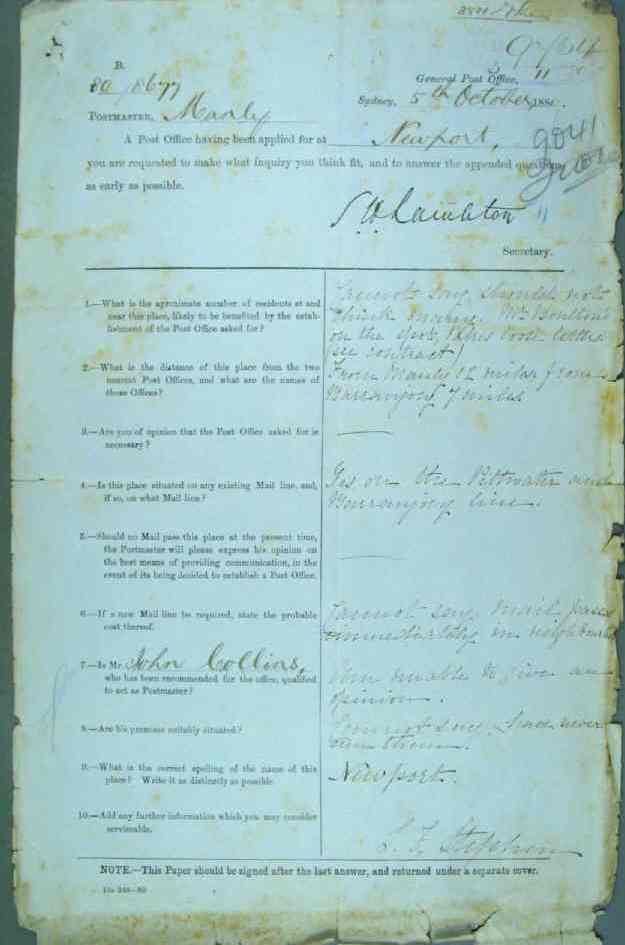
N E W P O R T H O T EL, PITTWATER.
JOHN COLLINS, Proprietor.
FIRST-CLASS ACCOMMODATION. BOATS ALWAYS AT THE WHARF.
for Fishing Parties, Buggies for Excursionists at the Hotel. The steamer Florrie starts from the wharf for Gosford and the Hawkesbury. Splendid ocean Beach. Grand Mountain Scenery. Pending the issue of a license the Hotel will be conducted as an Accommodation House. Coaches leave the Manly Wharf and the Colonnade Hotel, Manly, whenever required. Advertising. (1880, September 22). The Sydney Morning Herald (NSW : 1842 - 1954), p. 10. Retrieved from http://nla.gov.au/nla.news-article13468589
LICENSING BUSINESS.-A colonial wine license was granted to John Thomas Collins, of Newport. WATER POLICE COURT. (1881, February 9). The Sydney Morning Herald (NSW : 1842 - 1954), p. 7. Retrieved from http://nla.gov.au/nla.news-article13484357
Licensing Courts convened quarterly in the months of January, April, July and October. The dates of the sittings were proclaimed in the NSW Government Gazette and relevant local newspapers, in addition to a notice posted on the building where the Court was to assemble. Additional sittings could be called for the hearing of renewals and other business following due notice of the meeting times. However, no notice was required of sittings of the Licensing magistrate. Certificates issued by the Court were invalid unless the fee was paid to the Treasury within 28 days of the certificate being issued. The following license types could be issued: publican’s licenses, packet licenses (to sell liquor to passengers on ships after the journey had commenced); colonial wine licenses (to sell liquor made from Australian-grown fruit) booth or stand licenses; (to sell liquor for short periods at fairs, sporting and racing meetings) and brewer’s and spirit merchant’s licenses.
Unfortunately the Collins appear to have taken the ‘colonial wine licence’ beyond its definition and restrictions; not only were there rumours that they bought sly grog from local manufacturers but then dispensed and this was pointed at as the cause of at least one tragic accident and a later court appearance where they were set up and fell for it:
Particulars of the fatal boat- accident previously reported from Barrenjoey are given. It appears that Mrs. Phillips, her son John Phillips, Joseph Modini, a fisherman, and George Cobb, a foreman in the employ of Mr. Banks, lighthouse contractor here, were returning home in a small boat, when from some unexplained cause the boat filled. Modini and John Phillips succeeded in gaining the shore about a quarter of a mile off, but Mrs. Phillips and George Cobb were drowned. Mr. Black, of H. M. Customs, immediately upon receiving information, started with a party to attempt to recover the bodies. SYDNEY. (1881, April 20). Goulburn Herald (NSW : 1881 - 1907), p. 3. Retrieved from http://nla.gov.au/nla.news-article117443807
“A verbal statement as to the circumstances attending the deaths of Mrs Phillips and George Cobb, at Broken Bay, on the 11th April, has been made by Joseph Medina, the man who was in charge of the boat, and has been corroborated by a son of the deceased lady, John Henry Phillips, who was also in the boat at the time of the disaster. The statement is as follows: ‘I was in company with George Cobb, at Newport, at an accommodation house kept by John Collins, on Sunday, the 10th instant. He had engaged me to take him there that he could arrange for the reception of a headstone over a grave near there. I was to be paid £1 for the service. While there I saw him buy two bottles of brandy and one of schnapps, for which he paid Mrs Collins the sum of 10s. She said to him he was still in debt 2s more for the grog. He was the worse for liquor.
Leaving there he returned the same day with me to Pittwater. On the following day, Monday, I took George Cobb at his request again to Newport; he said he wanted to go there and get a little more grog to put him right. He was quite sober going over. I went there myself to bring Mrs Phillips home. She had been there working for the Collins. George Cobb got some grog there, and I started home in my small boat, in company with him, Mrs Phillips, and her son John Phillips. All went well till after passing Stokes’ Point, when George Cobb wanted a little grog, which Mrs Phillips did not want to give him, saying he had had plenty. He said he would get some himself, and on getting up for that purpose he slipped, lurching the boat over to the port side. The lurch threw Mrs Phillips over the side, also causing me to step on the thwart. The boat gunwale went under, and she filled, throwing us all into the water. With young Phillips I tried my best to save Mrs Phillips and Cobb, but could not, and they sank. Phillips, after some time swam for shore, which he reached. He got a boat there, and with a man named Alfred Wilson, came to my help. They took me off the bottom of the boat, to which I had been clinging from the time they sank. I think the whole accident came about through the grog. Signed, Joseph Medina, John Henry Phillips, before Albert Thomas Black, J.P.’
Mr Black, Customs officer and J.P., held an inquest yesterday into the causes which led to the accident, but the result is not yet known. The Coroner will also, it is expected, hold an inquest on the bodies.” (Daily Telegraph 19 April 1881- Shelagh and George Champion)
METROPOLITAN QUARTER SESSIONS.THURSDAY. The Metropolitan Quarter Sessions were resumed at Darlinghurst this morning, before Mr District Court Judge Murray. APPEAL CASE. John T Collins, of Newport near Pittwater, storekeeper, appealed against the decision of the licensing magistrates of the Water Police Court, under which he was fined the sum of £30 for selling whisky on March 14 last, at which time he was not the holder of a publican's Licence. The grounds of appeal were that the appellant was not guilty of the offence with which he was charged, and that the evidence of the informer was not corroborated. Mr Tarloton, instructed by Mr W Roberts, sen , appeared in support of the appeal, and Mr Backhouse and Sub-Inspector Atwell appeared to show cause why it should not be allowed In a great measure the case was a rehearing, but some additional evidence was given Sub Inspector Attwell gave evidence to the effect that appellant’s premises presented the appearance of an hotel, and that he had found considerable quantities of liquor, together with many glasses, there Evidence was also called to prove that so far as a n in named Walter Love was concerned liquor r had been sold and paid for at the place. Appellant contended that it was untrue that any such sale had taken place, and called witnesses in support of his contention but it was admitted that he was in the habit of giving people liquor and not charging them for it. The Judge said that he did not intend to upset the decision of the magistrates because he believed, from the evidence now produced, that it was perfectly right. The place was a sly grog shop of a very common character. Those who lived in towns were not aware of the existence of such places, but those who travelled through the country know that they had been carried on for years In fact, there was a strong impression in the minds of some persons that the Act was an unfair one, and that they could sell liquor with impunity but the law was that such persons if they broke it, must be fined. He would uphold the decision of the magistrates, and would also allow £5 of costs for counsel against the appellant Sarah Ann Collins, wife of the above named appellant, appealed against a similar conviction against her. The evidence was of the same character as that in the preceding case sub inspector Atwill deposed to having found liquor on the premises, and Walter Love proved that he had purchased a bottle of whisky from appellant the contention of appellant was that the whisky was obtained by Love under false pretences for another person who was a lodger, his conviction also was upheld, and costs were given against the appellant. METROPOLITAN QUARTER SESSIONS. (1883, June 15). The Sydney Morning Herald (NSW : 1842 - 1954), p. 3. Retrieved from http://nla.gov.au/nla.news-article13536960
Collins refused to give up his hold on the mail service although it was, however, advertised:
Manly and Newport, via Brady’s, Jenkins, and Boulton's, twice a week; and Newport, Barrenjoev, Blackwall, Kincumber, and Gosford, twice a week. General Post Office, Sydney, 27th August, 1881. CONVEYANCE OF MAILS. (1881, September 17). The Sydney Morning Herald (NSW : 1842 - 1954), p. 12. Retrieved from http://nla.gov.au/nla.news-article13494936
Mail Tenders – Northern Road. Manly and Newport, via Brady's, Jenkins', and Boulton's, twice a week , and Newport, Barrenjoey, Blackwall, Kincumber, and Gosford, twice a week-Not yet decided. Government Notices. (1881, October 24). The Sydney Morning Herald (NSW : 1842 - 1954), p. 13. Retrieved from http://nla.gov.au/nla.news-article13497436
The hotel was soon wrested from him too:
Publicans licenses were granted to ; and William Boulton, Newport. POLICE. CENTRAL POLICE COURT. (1882, February 1). The Sydney Morning Herald (NSW : 1842 - 1954), p. 3. Retrieved from http://nla.gov.au/nla.news-article13504198
What was going on in the background is that Mr. Jeanerret and Mr Pile were expanding their interest in the area and ridding themselves of Collins. There is reference in our previous History pages on the Newport Wharf, the S.S. Florrie and in Mount Loftus, Newport, that Mr Jeanerret and Mr Black were friends of some long standing. There is also, in the great History month we ran by Shelagh and George Champion OAM's, of The Murder of David Foley, in which the Collins family seem implicated in the demise of a good man. With little or no large scale Police Force in Pittwater at this time, men such as the Coast Waiter, invested with authority, and men with a bit of spine seemed determined to make the area not only more hospitable for visitors, but also safer for those already here by undermining the attempts of people who may have been considered 'undesirables' to further establish their ilk of establishment.
Charles Jeanerret applied for the Mail Contract in August 1880, an Inspection was conducted in October 1880, and Mr Jeanerret won the mail contract in November 1880:
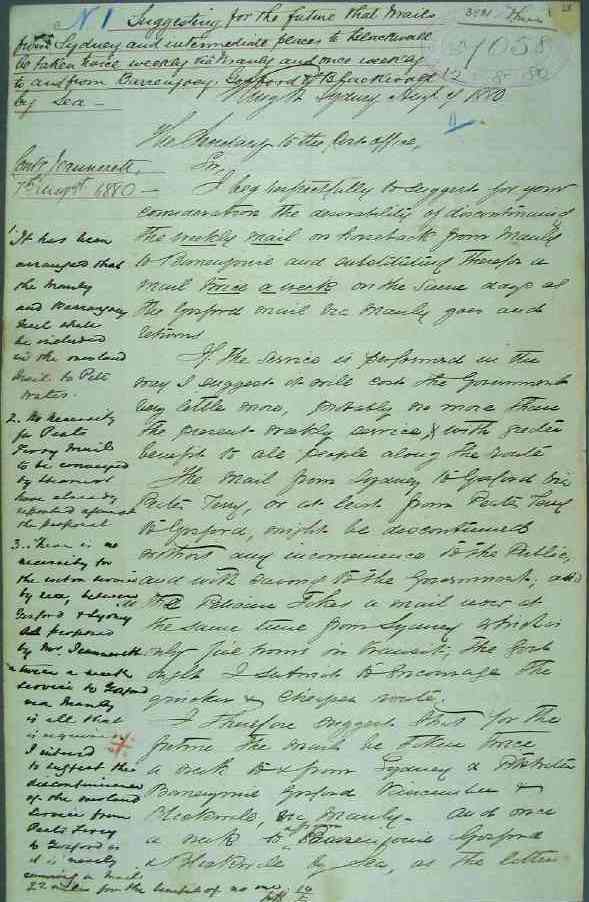
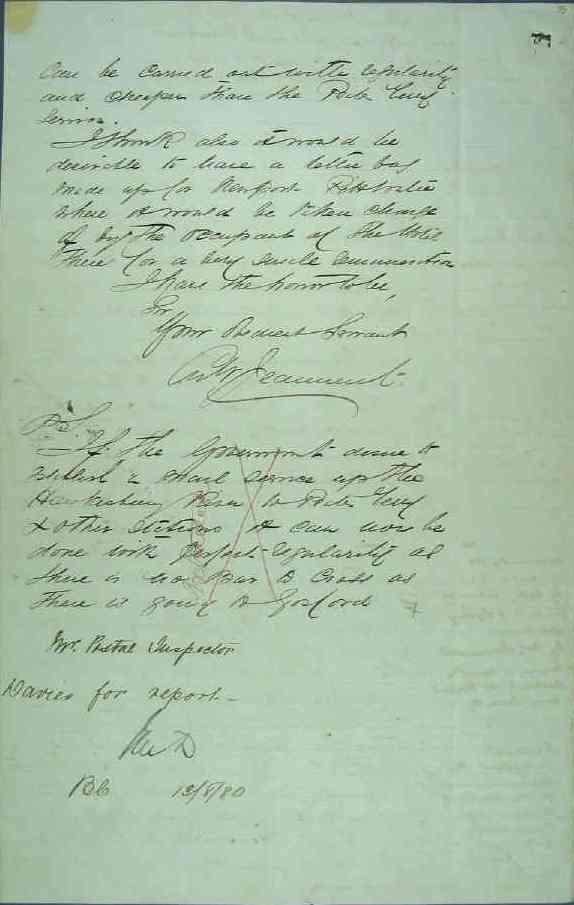
The Inspectors report+ Diagram submitted as part of this:
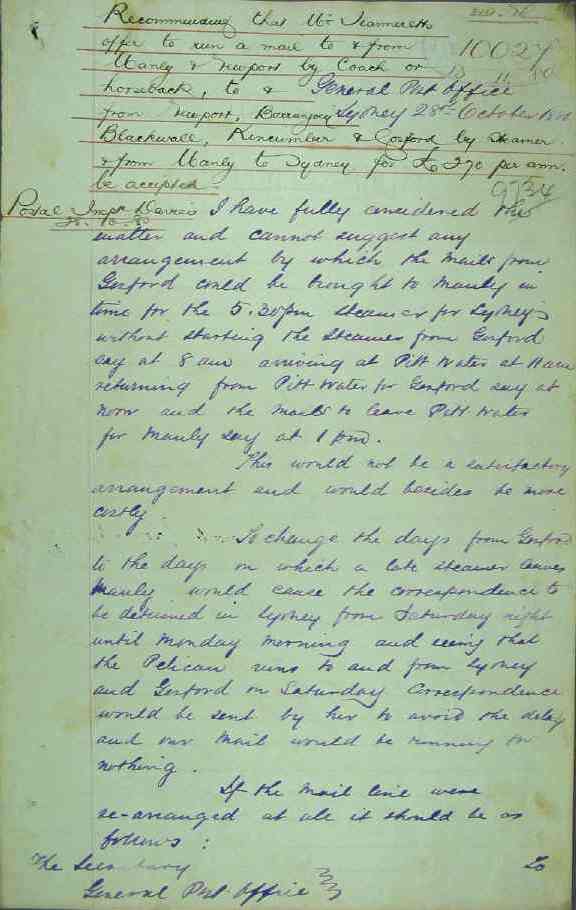
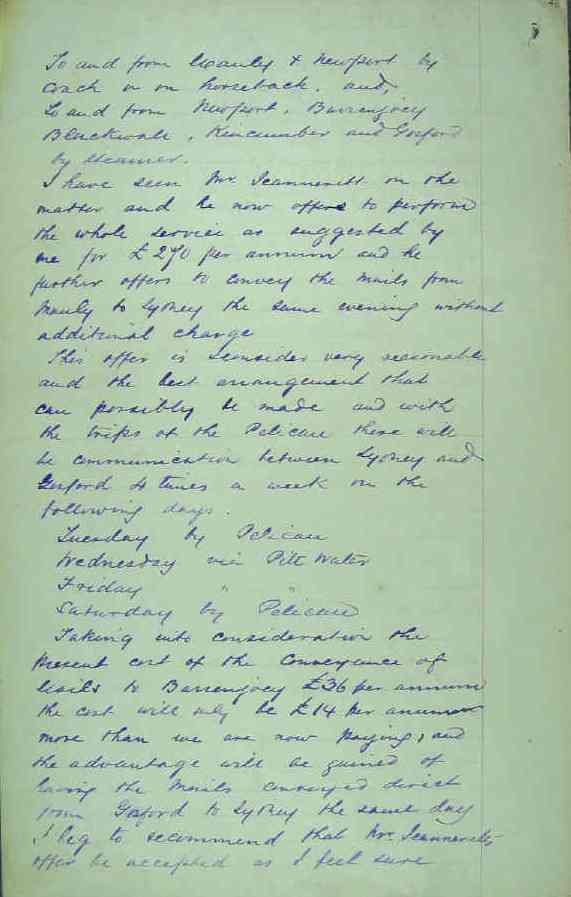
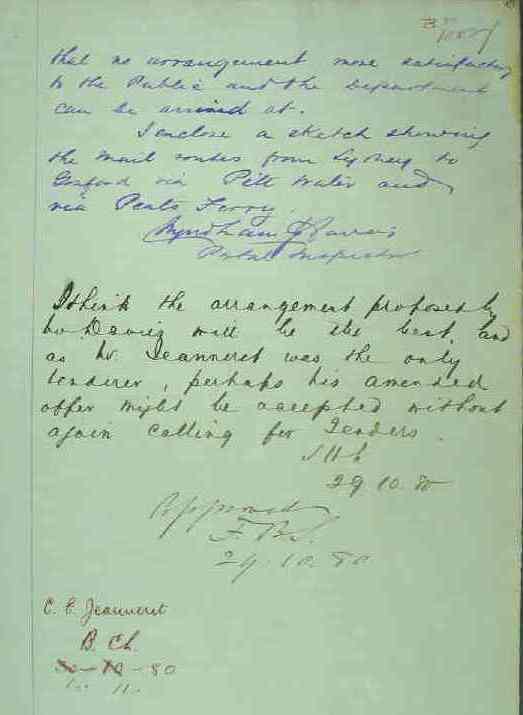
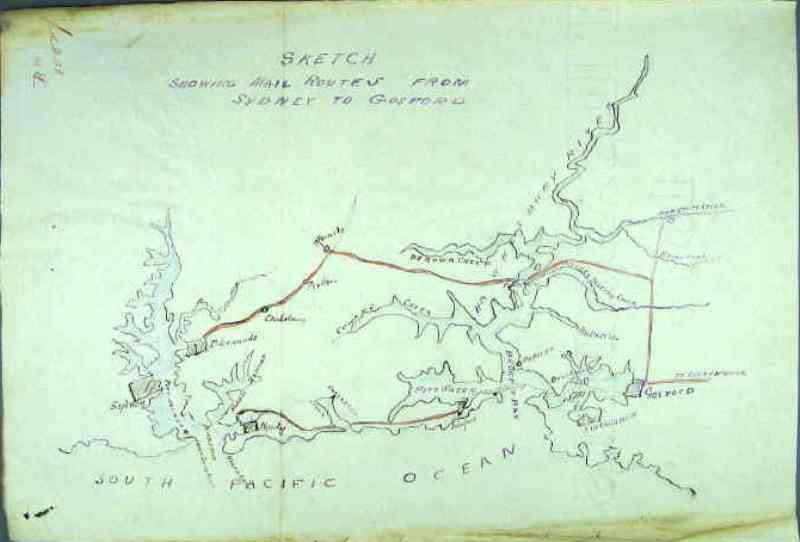
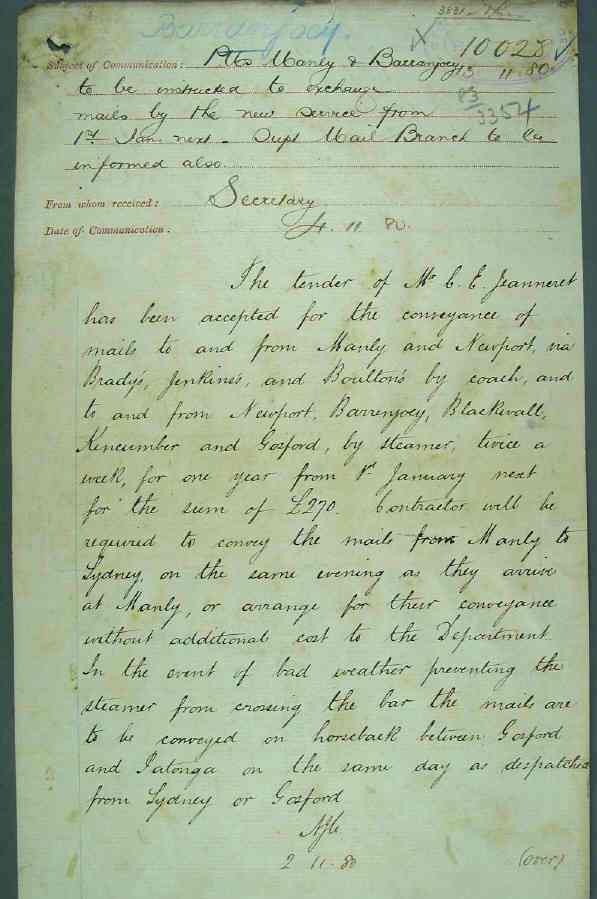
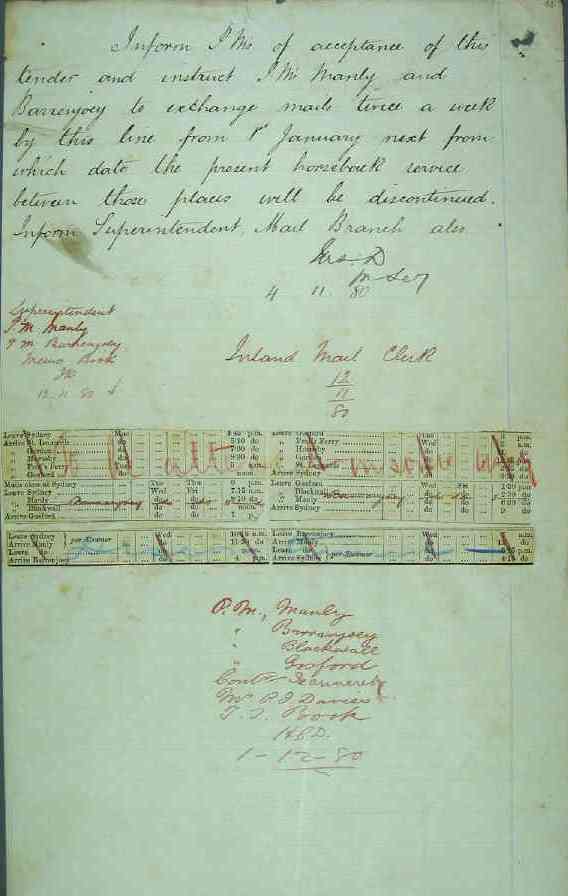
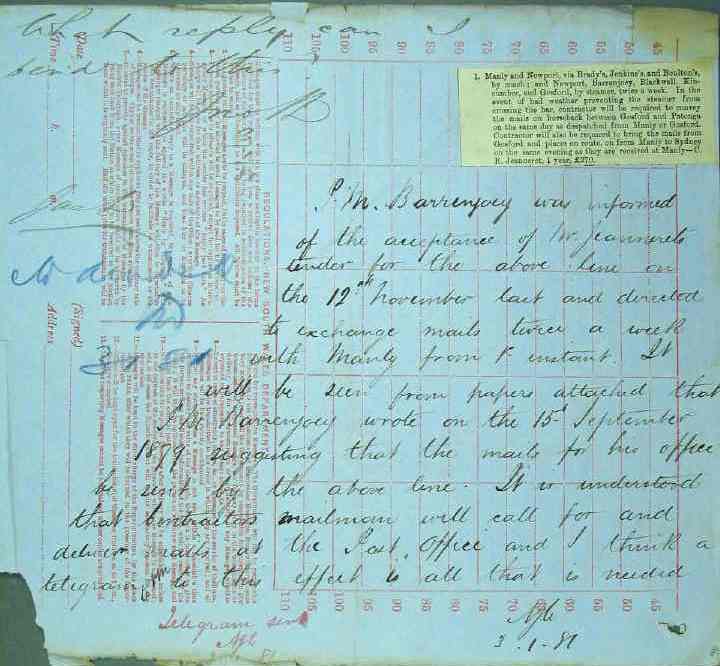
Meanwhile, across the estuary:
On 8 September 1881 Honorah Collins(Avalon Collins family – not Narrabeen – no relatives /non related) purchased from Therry’s estate the 80 acre grant at Bayview, next to Winnyjimmy Swamp, for £80, which was the market value of the land at the time. [LTO Book 229 No. 144] Honorah and her daughter Katherine lived at Bayview, Katherine taking on the duties of Post Mistress to the growing Bayview area on 21 August 1882. She married James Roche on 18 April 1883, and the land became known as Roche’s farm. – (Profiles of the Pioneers, 2013 - Shelagh and George Champion).
The death took place at Bayview yesterday, of an old identity of the district in the person of W. Bolton. He had been a resident of the locality for twenty-six years, and was the pioneer coachman to Bayview. He piloted the first overland mail from Sydney. Previously the mails came by a very roundabout way by sea, and were landed at the old wharf at Bayview. Bolton was very popular, and was, perhaps, the best-known man in the Pittwater district. BREVITIES. (1897, December 29). Evening News (Sydney, NSW : 1869 - 1931), p. 4. Retrieved from http://nla.gov.au/nla.news-article108874517
The name Bayview went back to 1882, when a post-office was opened in the residence of Mrs. Collins. BAYVIEW AND PITTWATER. (1936, June 19). The Sydney Morning Herald (NSW : 1842 - 1954), p. 17. Retrieved from http://nla.gov.au/nla.news-article17243899
The Heritage listed Church Point Post Office and general store building has been an iconic Pittwater structure and community gathering place from its first days. Located right on the waters edge of Pittwater at Church Point ( Formerly known as Chapel Point whose Aboriginal name is/was Whurra Whurra according to some sources; “Whurra, Whurra!” meaning “Go away!” or “go home!”) this structure has has seen a few changes. Originally opened in 1909 a post office near the original wharf and a boat shed and store were located on either side of the wharf.
Mail would have been unloaded prior to then by vessels or brought out from Bay View post office:
Accepted Tenders: William Boulton; construction of wharf at Church Point, Pittwater. GOVERNMENT GAZETTE. (1884, December 31). The Sydney Morning Herald (NSW : 1842 - 1954), p. 6. Retrieved from http://nla.gov.au/nla.news-article13578833
William Boulton also won the Mail Contract but only for a while. It was re-advertised in 1884:
MANLY TO NEWPORT AND PITTWATER. Boulton's Royal Mail Coaches leave Manly every SATURDAY, at 3.30p.m., returning Mondays at 5 a.m. WILLIAM BOULTON, Newport Hotel, Newport. Advertising. (1883, June 15). The Sydney Morning Herald(NSW : 1842 - 1954), p. 9. Retrieved from http://nla.gov.au/nla.news-article13537010
A Meeting of the residents of Pittwater was held on Saturday evening at the Bolton Hotel, for the purpose of urging the Government to-make tho road from the Lagoon to Newport. Mr. Crawford, who was voted to the chair, explained the object of the meeting, and drew attention to tho state of the road, which in some parts was almost impassable. He stated that he was convinced it was only necessary to bring the matter under the notice of the Minister for Works to get the work done. After several speeches had been made, the following gentlemen were appointed to form a deputation to wait upon the Minister:-Messrs. Mc Koowa, Dr. Tibbitta, J. Riley, B. James, and F. Smith. NEWS OF THE DAY. (1883, March 28). The Sydney Morning Herald (NSW : 1842 - 1954), p. 7. Retrieved from http://nla.gov.au/nla.news-article13531240
Contract 30m McGarrs Creek-road. Pittwater, contract 31m (miles) Road Pittwater to Barrenjoey. Advertising. (1883, November 24). The Sydney Morning Herald(NSW : 1842 - 1954), p. 5. Retrieved from http://nla.gov.au/nla.news-article28372503
CONVEYANCE OF MAILS. It is hereby notified that the following Tenders for the Conveyance of Mails, from the 1st January next, have been accepted. Manly and Barrenjoey, -via Newport, twice a week-To be re-advertised. Advertising. (1884, October 25). The Sydney Morning Herald(NSW : 1842 - 1954), p. 5. Retrieved from http://nla.gov.au/nla.news-article28367164
Until:
Mail Contract. — The mail contract from Manly to Newport for the ensuing three years has fallen into the hands of Messrs. Black and Co., cab proprietors, of Manly. This ought to be welcome news to the travelling public. In. the past the fatigue of walking through, sand and up the . hills, and the pain, of witnessing jaded horses have rendered what ought to be a very pleasant trip something akin to martyrdom. The good name -which -attaches to Slack and Co.'s stables augurs well for the numerous travellers by mail to Newport. News from Manly. (1884, December 4).Evening News (Sydney, NSW : 1869 - 1931), , p. 5. Retrieved from http://nla.gov.au/nla.news-article107278746
Mr. Black, late of Parramatta, has obtained the contract for the mail service between Manly and Pittwater, and purposes placing on the line comfortable vehicles and fast horses in order to encourage a large excursionist traffic to the Hawkesbury. The Bourkers Burked. (1884, December 9). Evening News(Sydney, NSW : 1869 – 1931), p. 4. Retrieved from http://nla.gov.au/nla.news-article107275652
Joseph Ebenezer Black was born at Dural in 1846 and spent the early part of his life at Dural working his parent’s farm. He followed the business lead of his brothers and established a livery stable and mail delivery business at Manly. In 1884 Joseph won a contract to deliver the mail from Newport to Barrenjoey. Joseph married Martha Francis Baker in 1888.
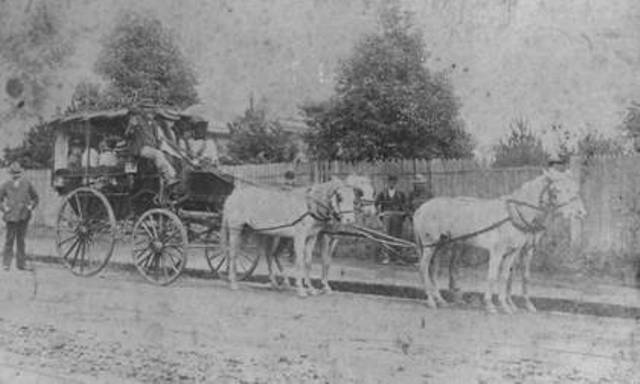
Joseph at Newport with passengers and the mail - courtesy Mr Black's family
DEATH OF AN OLD DURALITE. Mr. Joseph E. Black passed away at his residence, East Gosford, on Tuesday, aged 73 years. He had been ailing for the past six months, suffering from an affection of the heart. Deceased was born at Dural, where his people were well known fruitgrowers; and he was a member of a family consisting of eight sons and two daughters. Two brothers and a sister still survive. He leaves a widow, two sons and a daughter. The oldest son is head steward on the Ventura, and the other son is managing a station property on the Northern Rivers. The late Mr. Black was a resident of Gosford for about 15 years, prior to which he was in business at Manly, where he conducted livery stables, and sold out when motor cars came into universal use. He was a genial, kind-hearted and highly-respected resident of the community, and his demise is genuinely regretted. The funeral took place on Wednesday afternoon, the remains being interred in Point Clare cemetery. — ‘Gosford Times.’ [Mr.. Black was a brother of Messrs J. E. Black, Ted Black, Fred Black and others of that well-known family.] DEATH OF AN OLD DURALITE. (1919, August 9). The Cumberland Argus and Fruitgrowers Advocate (Parramatta, NSW : 1888 – 1950), p. 6. Retrieved from http://nla.gov.au/nla.news-article86109859
It seems that he who held the reins also held the opportunities for other ventures in the area, and also needed fresh horses or room to place them when they arrived in Pittwater:
CAUTION TO SHOOTERS AND PICNICKERS. NOTICE is hereby given that persons found trespassing on our leased lands at Narrabeen Lake, extending front the picnic grounds to Bay View-road, without holding our exemption ticket, will be prosecuted as the law directs. Cattle will be impounded. JOSEPH BLACK and CO.. Livery Stables, Manly. Department of Public Works, Railway Branch. Sydney, 20th May, 1885. GOVERNMENT RAILWAYS. (1885, May 23). The Sydney Morning Herald (NSW : 1842 – 1954), p. 5. Retrieved from http://nla.gov.au/nla.news-article13589158
While at the hotel:
William Boulton, licensee of the Newport Hotel, Newport, applied, under the 11th section of the Amending Licensing Act, to have the license fee with respect, to his premises reduced from £30 to £16. In the application it was stated that the applicant’s premises are actually required for the accommodation of travellers, and are not accessible by any practicable roadway to any licensed premises, situated within 10 miles of the aforesaid premises. The police reported favourably with respect to the application. Inspector Lenthall stated that there was no licensed house within 14 miles of that kept by Boulton. There were no people about there to support a house, and it was required exclusively for the accommodation of persons travelling from Manly to Broken Bay and other places in that district, lto recently he had to visit on duty the neighbourhood of the licensed house. The steamer which conveyed him thither broke down, and if it had not been for the existence of Boulton's house he would have had to appeal to some of the settlers to find him accommodation. Mr. Addison said that the applicant was in accordance with the law thoroughly entitled to a reduction, and the Bench considered that on other grounds the adoption of such a course was desirable. The license fee would therefore be reduced to £15. POLICE. (1885, January 30). The Sydney Morning Herald(NSW : 1842 - 1954), p. 5. Retrieved from http://nla.gov.au/nla.news-article13583696
Renewals of licences were granted to the following –W Boulton Newport Hotel POLICE. (1883, January 31). The Sydney Morning Herald(NSW : 1842 - 1954), p. 5. Retrieved from http://nla.gov.au/nla.news-article13526591
W. Boulton to C. A. Schaffer, Newport Hotel, Newport; Licensing Court. (1885, October 9). Evening News (Sydney, NSW : 1869 - 1931), p. 6. Retrieved from http://nla.gov.au/nla.news-article111347028
A certificate for a new licence was granted to W.Boulton, of the Newport Hotel,Newport. LAST MOMENT. (1886, May 20). Globe (Sydney, NSW : 1885 - 1886), p. 5 Edition: FIRST EDITION and EVENING. Retrieved from http://nla.gov.au/nla.news-article102562749
William Boulton to William Bulfin, Newport Hotel, Newport. LICENSING COURT. (1887, April 1). The Sydney Morning Herald (NSW : 1842 - 1954), p. 4. Retrieved from http://nla.gov.au/nla.news-article28349476
MANLY, NARRABEEN, ROCK LILY, and NEWPORT. BLACK and CO S COACH. Leaves Manly at 10 am. MONDAYS, WEDNESDAYS, THURSDAYS, and SATURDAYS, returning to Manly to meet 6 o'clock steamer to Sydney. Leaves Manly at 8 a.m. on TUESDAYS and FRIDAYS, returning to meet 4.30 steamer to Sydney. Book at Tourists' Bureau. Advertising. (1887, May 27). The Sydney Morning Herald (NSW : 1842 - 1954), p. 2. Retrieved from http://nla.gov.au/nla.news-article13653272
3. Manly, Newport, and Bayview, three times a week (tenderers to specify a price for a six times a week service, if required); and 14. Newport and Barrenjoey, twice a week ; or 15. Manly, Newport, and Bayview three times a week (tenderers to specify a price for a six times a week service, if required) ; and Newport and Barrenjoey, twice a week, Advertising. (1887, November 19). The Sydney Morning Herald(NSW : 1842 - 1954), p. 5. Retrieved, from http://nla.gov.au/nla.news-article13671788
A new mail man won the above tender, the pay going up along with the times he came here
TENDERS ACCEPTED. - The following tenders have been accepted : Conveyance of Mails. Manly, Newport, and Bayview, six times a week, and Newport and Barrenjoey, twice a week-Thomas Frost, coach, two or four horses, one year, £150 ; GOVERNMENT GAZETTE. (1887, December 10). The Sydney Morning Herald (NSW : 1842 - 1954), p. 7. Retrieved from http://nla.gov.au/nla.news-article13668076
This incident is included as no one drowned, so you may giggle, and it also illustrates that the Telegraph was still the communication system of speed during this time:
BOAT ACCIDENT AT PITTWATER. [By Telegraph.] (from our correspondent.). BARRENJOEY, Monday. A pleasure boat, having on board several members of the Orpheus Club, including Mr. Johnson (the secretary), and other gentlemen, capsized this evening in Pittwater. Fortunately some fishermen - by name, S. Strongman, Webster, T. Edwards, and others saw the accident. They quickly put off and succeeded in rescuing all the party, none of whom (excepting Mr. Elwin, of Dubbo) were much the worse for their immersion. Mr. Elwin, on landing received every attention from F. Jackson, of the yacht Violet, and by the evening he had fully recovered. The steamers Mystery and Hawkesbury started for Sydney this evening, but were compelled to return owing to the heavy sea. BOAT ACCIDENT AT PITTWATER. (1888, October 9). The Sydney Morning Herald (NSW : 1842 - 1954), p. 7. Retrieved from http://nla.gov.au/nla.news-article13699015
Edward Potter, St. Leonards, wrote asking permission to take up the running of Mr. Wilkes's line of coaches on Saturday nights and on Sabbath days. The matter was referred to the local council for advice. A time-table was submitted by Mons. Leon Houreux for approval concerning the running of his line of coaches between Manly and Narrabeen. It was referred to the Manly Council for advice. The application of Joseph Black to ply a coach between Manly and Church Point was refused, owing to the line being already occupied. Metropolitan Transit Commission. (1890, May 22). Evening News (Sydney, NSW : 1869 - 1931), p. 5. Retrieved from http://nla.gov.au/nla.news-article128770918
From Joseph Black, asking permission to ply a second coach between Manly and Newport. The matter was referred to the Manly Council for advice. GENERAL BUSINESS. The drivers licences of Alfred Ruddock, William Black, and William Lawler (cabmen) were cancelled. Metropolitan Transit Commission. (1890, May 29). Evening News (Sydney, NSW : 1869 - 1931), p. 2. Retrieved from http://nla.gov.au/nla.news-article128776713
The Manly Council wrote approving of the applications of Messrs. Leon Houreux and Joseph Black for vehicular licences to ply in and about that locality. Metropolitan Transit Commission. (1890, June 5). Evening News (Sydney, NSW : 1869 - 1931), p. 5. Retrieved from http://nla.gov.au/nla.news-article128777295
It was around now that the suburban letter carriers began to get a bit tired and feel a bit put upon:
The question of the suburban letter –carriers weekly half-holiday has been for some time under the consideration of the postal authorities, and the Postmaster-General, having obtained reports from some of the principal officers of the department, has arrived at a decision. About 1 months since (owing to complaints that letters posted too late for the morning delivery on Saturday, and correspondence arriving by the express train on that day, were kept in the post offices until Monday forenoon), the half-holiday, which previously had been planned only in those suburbs in which the residents specially requested it, was, as alternative measure, changed from Saturday to Wednesday and made to apply to all suburbs. This plan, however, has also been objected to, and it is evident that any arrangement which does not provide for regular deliveries on all week days alike will not give satisfaction, it has been determined that deliveries shall be effected accordingly, and that each letter-carrier shall be allowed a whole holiday once a fortnight, special arrangements being made for the discharge of the duties of the carriers when taking such holiday. The change will be brought into operation on the 1st of July, or as soon thereafter as practicable. THE SYDNEY MORNING HERALD. (1890, June 13). The Sydney Morning Herald (NSW : 1842 - 1954), p. 4. Retrieved from http://nla.gov.au/nla.news-article13787111
How civilised - a whole day off once a fortnight! Mr Black was attempting to expand his interests:
A letter was read from the North Sydney Council in reply to a letter of the board re an application from Mr. Joseph Black, and a petition requesting that the Neutral Bay line of coaches be extended to the Spit-road. The letter stated that the council, after having considered the matter, resolved that it would be against the interests of the residents of the district to grant Mr. Black's application. Letter was read from the Treasury stating that there was no objection to additional omnibuses being allowed to occupy Circular Quay provided that not more than eight were on the stand at onetime ; and also provided that each company that availed itself of this arrangement agrees to pay to the manager of the Circular Quay the sum of -£25 per annum towards the expense of keeping the Quay clean. Transit Commission. (1891, July 16). Evening News (Sydney, NSW : 1869 - 1931), p. 6. Retrieved from http://nla.gov.au/nla.news-article111982485
From the transit commission, stating that the application of Mr. Joseph Black to extend his line of coaches from Neutral Bay to the Spit road had been refused; received. NORTH SYDNEY. (1891, July 23). Evening News (Sydney, NSW : 1869 - 1931), p. 2. Retrieved from http://nla.gov.au/nla.news-article111979700
The application of Joseph Black to ply a waggonette between Manly and Bayview was refused. METROPOLITAN TRANSIT COMMISSION. (1891, September 17). The Sydney Morning Herald (NSW : 1842 - 1954), p. 7. Retrieved from http://nla.gov.au/nla.news-article13839119
Others, too, were employed:
A mailman named Robert Tibbie had one of his legs broken near Manly on Friday afternoon. While returning on horse back from Barrenjoey, where he had been delivering the mails, the horse stumbled while cantering- down a steep incline, and fell. Tibbie was thrown heavily to the ground, where he lay some hours till assistance arrived, and he was conveyed to Manly, where the fractured limb was set by a doctor. BREVITIES. (1892, August 15). Evening News (Sydney, NSW : 1869 - 1931), , p. 5. Retrieved from http://nla.gov.au/nla.news-article112600909
4. Manly, Brookvale, Narrabeen, and Newport, six times a week; and Newport and Barranjoey, twice a week—Leon Houreux, of Pitt water, via Manly, by vehicle between Manly and Rock Lily, and thence to Barranjoey on horseback, 1 year, £65. CONVEYANCE OF MAILS. (1893, November 24). New South Wales Government Gazette (Sydney, NSW : 1832 - 1900), p. 8988. Retrieved from http://nla.gov.au/nla.news-article220973914
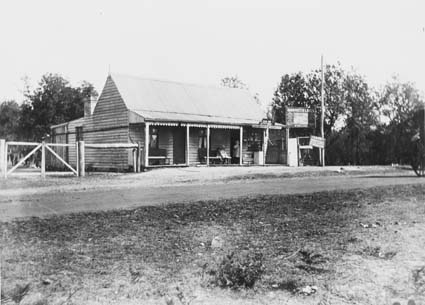
Narrabeen Post Office and store, 1897, Image No.: C4076, HN1001, courtesy National Archives of Australia.
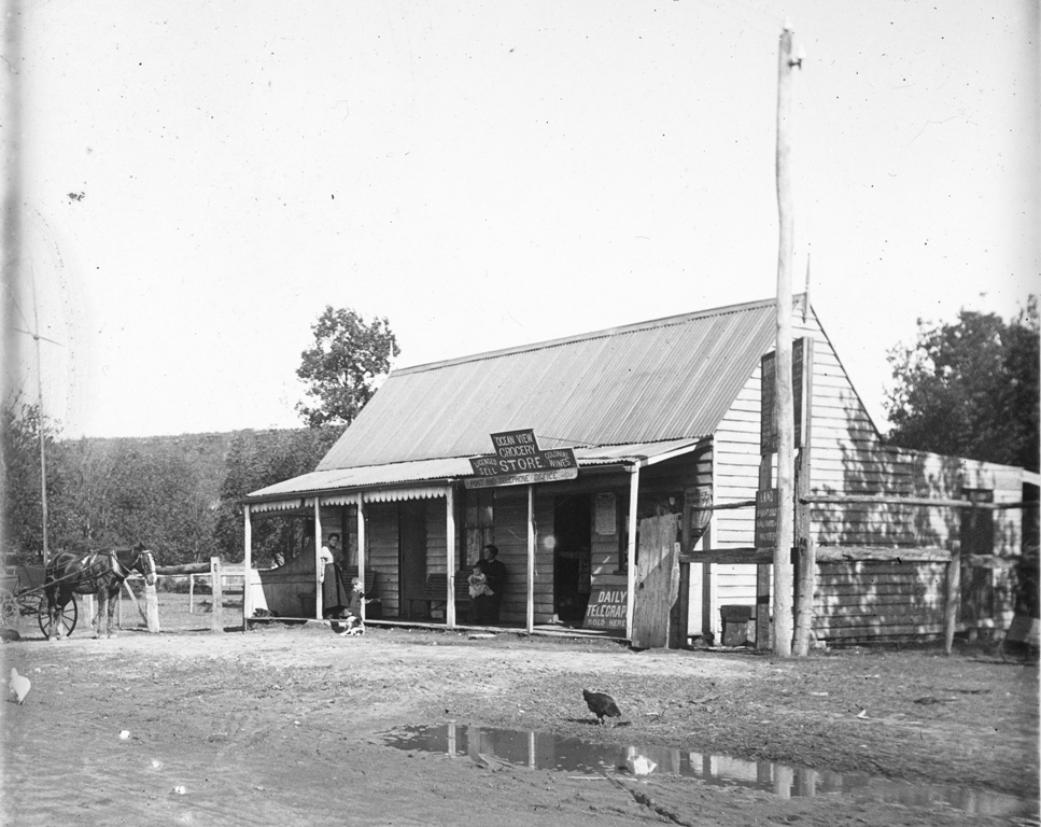
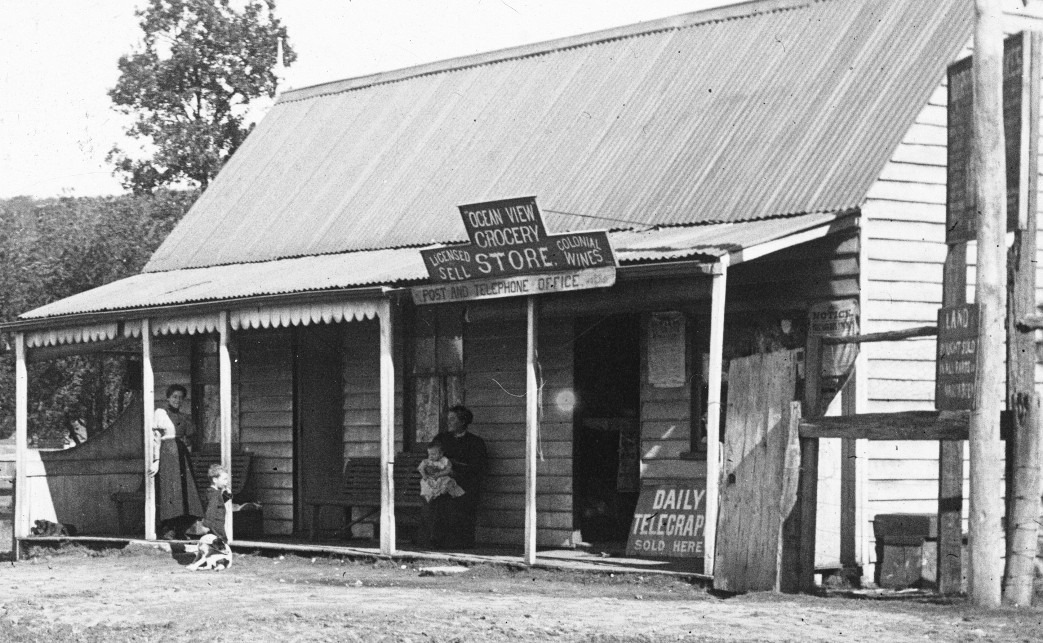
A post office will be established on the 1st proximo at Narrabeen (in lieu of the receiving office), between Manly and Newport. GOVERNMENT GAZETTE. (1898, February 21). Evening News (Sydney, NSW : 1869 - 1931), p. 3. Retrieved from http://nla.gov.au/nla.news-article108772830
A new Contractor announced:
TENDERS ACCEPTED. Following is a list of accepted tenders for Mail Contracts on the Northern Roads of the colony ;—Manly, Brookvale, Narrabeen, and Newport, Newport and Barranjoey, with branch line to and from ' The Junction' and Bayview — C. H. Massey, £90, and £35 if required six times a week extra. The Annual Mail Contracts. (1898, October 24). The Maitland Daily Mercury (NSW : 1894 - 1939), p. 6. Retrieved from http://nla.gov.au/nla.news-article123624806
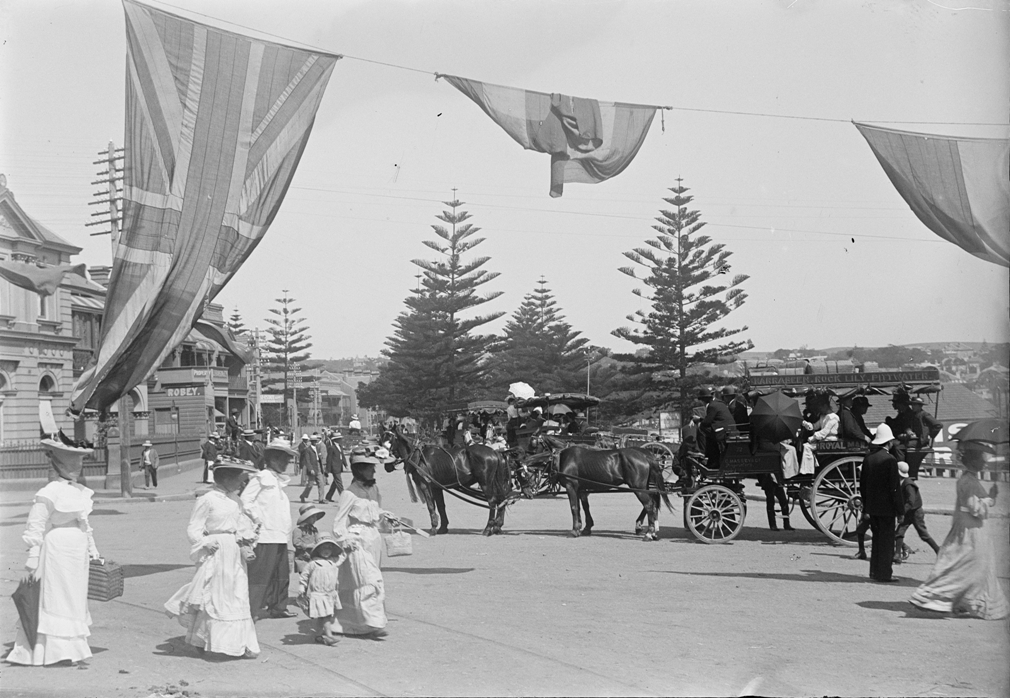
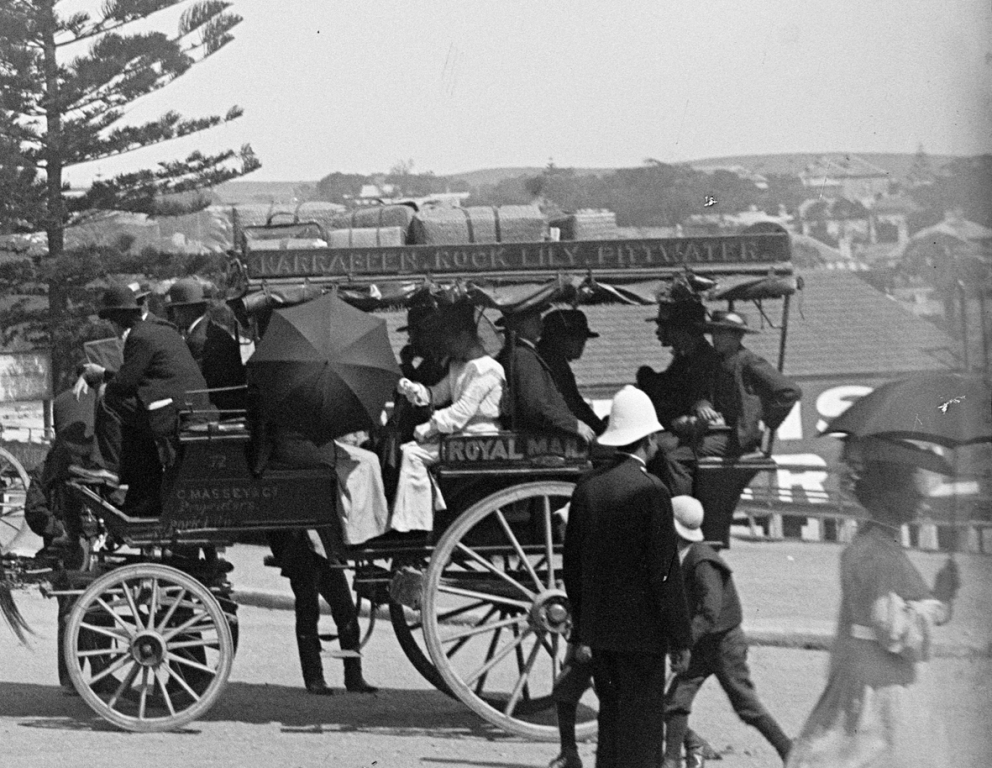
The stories of the Wild Coachmen of Pittwater constitutes a page to itself in how they contributed to Communication to and with Pittwater. One small incident seems to back up so many 'wild ride' claims shortly before the motorised 'omnibus' versions began taking over the routes and the second illustrates their immediate 'impact':
SENSATIONAL ACCIDENT. A COACH OVERTURNED. THREE PERSONS SLIGHTLY INJURED. A sensational coach accident occurred yesterday morning on the Pittwater-road, about two miles from Rock Lily. A vehicle containing 16 passengers overturned, three of the occupants being slightly injured. The coach is the property of Charles Massey and Co., of Manly, and runs between Rock Lily and Manly. As usual, four horses were attached to the vehicle, and all went well until the party reached Sheep Station Hill, which is very steep. There the reins of the leading horses became entangled with those in the pole of the coach. The driver, Harry Duncan, endeavoured to right matters, but before he was able to do so the horses swerved, the coach was overturned, and the passengers quickly found themselves on the roadway. When most of them had recovered from the shock caused by the accident, it was found that three of their number had been injured. Dr. Thomas, of Manly, was immediately sent for, and on arrival attended to their injuries.
Mrs. Rachel Cornu, who resides at Rock Lily Hotel, was found to be suffering from bruises on the right side, and shock. James Cooper, 39, an engineer, of Russell-street, Granville, sustained a scalp wound, which necessitated the insertion of three stitches. The third victim was Alfred Alexander Smith, a school teacher, living at Augustus-street, Enmore, his injuries consisting of cuts on the forehead and shin.
The coach was quickly righted and continued its journey to Rock Lily without further mishap. SENSATIONAL ACCIDENT. (1905, December 30). The Sydney Morning Herald (NSW : 1842 - 1954), p. 10. Retrieved from http://nla.gov.au/nla.news-article14718625
COLLISION AT MANLY. MOTOR CAB DRIVER FINED £5. At the Water Summons Court, Subinspector M'Donough proceeded against Austin White, of Manly, on the information, that he had driven a motor car in Pittwater-road, Manly, so furiously as to endanger the safety of certain persons. He pleaded not guilty. Charles Henry Massey, coach proprietor, stated that he was on the Pittwater-road, driving a four- seated buggy, accompanied by three others, and, when about 100 yards from the Lagoon Bridge he saw the defendant, who was driving a motor omnibus, in the direction of Pittwater. Defendant came round the corner so quickly that he could not escape witness. The latter pulled up his horse sharply. Defendant came round the corner at a pace of from eight to ten miles an hour. He took a wide sweep, and tried to avoid witness, but struck the shaft of the vehicle. Two of the gentlemen were thrown out of the buggy. The vehicle was damaged. The defendant made a statement as to how the accident happened. He denied going round the corner at eight miles an hour. It was the horse shying which caused the accident. The horse hit the car twice. Other witnesses were called for the defence. Defendant was fined £5, with costs, in default, one month's hard labour. COLLISION AT MANLY. (1906, May 23). Evening News (Sydney, NSW : 1869 - 1931), p. 3. Retrieved from http://nla.gov.au/nla.news-article114324239
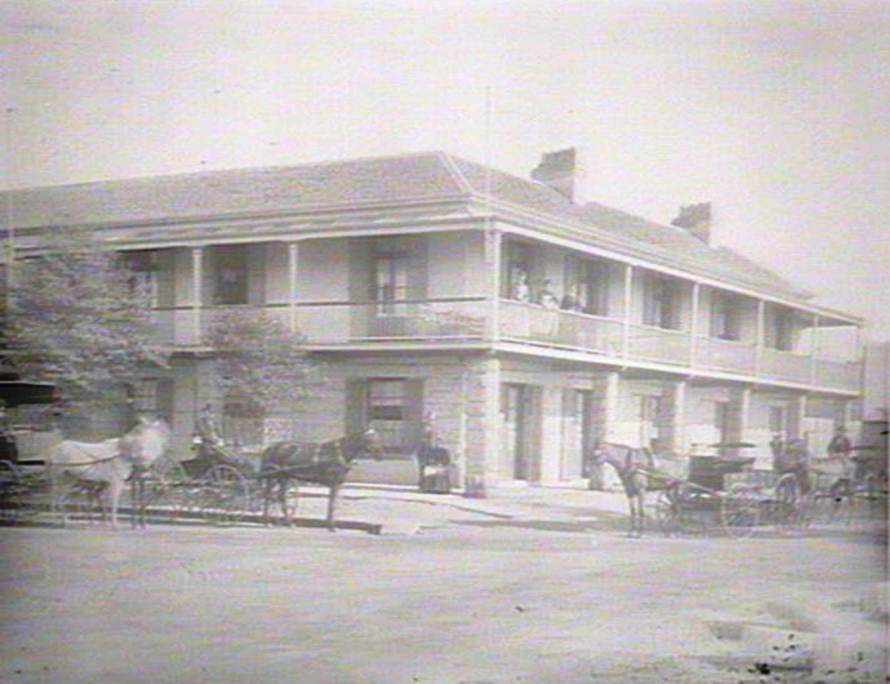
Steynes' Hotel, Manly Beach, GPO original locations or series - Sh315, circa 1890-1900, Image No.: d1_05447, courtesy State Library of NSW.
In fair Pittwater we were getting more and more 'up to date':
A SKETCH OF PITTWATER. When Governor Phillip first set out in search of good farming land, close to the settlement at Sydney Cove, he found some on the coast a few miles north of Manly, where he also discovered ' the finest piece of water I ever saw,' which he named after William Pitt the younger, the British Prime Minister at that time. It took the Governor and his party three days to complete their excursion to Pittwater. They had to wade through the swamps and marshes of Curl Curl, Dewhy, and Narrabeen lagoons. The same journey can now be performed in little over an hour. The swamps and marshes have been drained, the lagoons bridged, and there is an excellent road from Manly to Newport. It is very popular with cyclists from the city and suburbs. Narrabeen and Rock Lily are favourite picnic grounds on holidays, and were more facilities for transit available, there is no doubt that the bulk of the vast crowds that visit Manly on Saturdays and public holidays would extend their journey outwards to enjoy the magnificent scenery of sea and land, for which the drive to Pittwater is justly celebrated.
The people of Pittwater and Narrabeen are agitating for a light railway or tramway from Manly to Newport. Such a means of communication would open up a splendid district, and afford excursionists the healthiest and most attractive outlet perhaps in the whole world. The Hawkesbury has been called by Trollope and other travellers the Rhine of Australia. Pittwater at its mouth deserves to be designated the garden of the beautiful river. That part of Pittwater between Newport and Barrenjoey is a true peninsula, At one time, and not very long ago apparently, it must have been an island. A few feet depression in the neck at the foot of Mount Loftus would make it one now. The road from Newport to Barrenjoey is neglected. For two miles it is a series of hills and hollows, cut, rutted, and washed away in divers places. The cyclists generally avoid it, and so would the horse if he could help himself. It is dangerous and laborious to vehicular traffic, and is a drawback to settlement in that part of the district. Now that Barrenjoey is to be fortified, there is some talk of cutting down or tunnelling the hills, and filling in the hollows. As it is the only road by which an invading army could reach Sydney from Broken Bay, their progress could be stemmed in the cuttings there by a few hundred men, as effectually as the 300 Spartans blocked the Persian hosts at the Pass of xhermopylio. But apart from the military use that may be made of the road, it is a work of necessity on the part of the Government to make its hilly ways level in the interests of those who have taken up land there. Settlement has been delayed there by the difficulty of road access, it is said. The owners of land about there have been taking things too easy. They neither approached the Government nor their representative on the matter. Mr. Dugald Thomson, the member for the district, would, I am sure, have done something for them had their requirements been brought under his notice. It may not yet be too late to do so. There are still, unfortunately, unemployed. If the Government is to provide work for them, what work is more urgent than this road? It is a national work that must be done some day. It is a work that will facilitate settlement on the land beyond Newport. It is a work that will be of more lasting benefit than sand-shifting or Bogan scrubbing. It is a work in which the tourist and the excursionist in quest of the grand and beautiful are interested. The landmarks on the road from Newport to Careel Bay are Farrell's farm, west of Bilgola Beach, and Dalley's Villa, situated on the ocean beach, in the valley of palms and ferns.
There the deceased Privy Councillor often retired to enjoy 'rapture on the lonely shore,' and the music of the boundless Pacific. The 'old homestead' near the head of Careel Bay, where the pioneer settler and patriarch of Pittwater, Mr. John Collins lived, is a place of interest. He was monarch of all he surveyed there for upwards of a generation, until the estate was sold in 1880. It consisted of two grants to Father Therry in 1833 and 1837, made to the good and holy Archpriest probably as compensation for the injustice inflicted upon him, and the bitter persecution of which he was the victim some years before then. By his will Father Therry left the estate to the Jesuits, who sold it, as I have said, in 1880. The western shore of Pittwater harbour is all taken up, and dotted with pretty homesteads and a few cyclist 'boxes.' There is a good road skirting the shore as far as Church Point or M'Gar's Creek, which gives it an advantage over the eastern side of the harbour. Mr. J. Roche's orchard at Bay View is a place of beauty and of profit to the enterprising owner. His poultry-yard is an exhibition in itself, where the rarest varieties of fowls may be seen, all in first-class condition. Over this pen and that and the other is the Agricultural Society's first-class award, given at different exhibitions. A visitor's judgment is that if he had sent his whole stock to the Exhibition he might defy all competition. The Bay View Post-office, with a telephone, is attached to a store in front of his grounds. The various industries that Mr. and Mrs. Roche successfully conduct are worthy of praise and admiration. There is also a post and telegraph office at Newport, so that in the matter of postal, telegraphic, and telephonic communication Pittwater is up to date. Religion and education are amply provided for at Pittwater. Most of the denominations have places of Divine worship there. There are two Catholic churches, one at Josephton, Careel Bay, and the other at Mona Vale, which are served by the Rev. Father Dowling, or one of the priests attached to St. Patrick's College, Manly. There is a Public school at Bay View, and one also at Newport. A SKETCH OF PITTWATER. (1898, May 7). Freeman's Journal(Sydney, NSW : 1850 - 1932), p. 20. Retrieved from http://nla.gov.au/nla.news-article115386531
POLICE PROTECTION FOR PITTWATER. TO THE EDITOR OF THE HERALD. Sir,-The residents of Pittwater are awakening to the fact that police protection is urgently needed for the district. Robberies have been rather frequent of late, the distance being too far from Manly for Senior-sergeant M'Intosh or his men to be able to keep under their supervision a most undesirable class who visit the locality occasionally on Saturday evenings. The local post-office and store has lately been broken into and robbed, the postage-stamp drawer wrenched open, and sundry articles stolen. As the district is rapidly increasing in population the authorities may probably see the necessity for supplying the want. I am, i.e.,_ ONE INTERESTED. POLICE PROTECTION FOR PITTWATER. (1899, March 1). The Sydney Morning Herald (NSW : 1842 - 1954), p. 10. Retrieved from http://nla.gov.au/nla.news-article14202246
WANTED A CONSTABLE. The residents of Narrabeen, Bayview, and Pittwater are agitating for a constable to be stationed in the district. At present the only protection the residents have from lawbreakers is from Manly, which has proved entirely inadequate owing to the time lost in getting to Manly to report a case, and returning. The recent robberies at the Bayview Post Office and the Narrabeen Hotel have accentuated the want of better police protection, and the Progress Associations have made application for a man to be stationed in the district. Bayview and locality is visited by cartloads of young fellows, who drive from the city to shoot and fish, and who stay from Saturday to Monday. Some of these visiting parties are composed of not very desirable characters, and it generally happens that on Monday mornings the residents miss poultry, fruit, etc. It is suggested that the applied-for man In blue should be situated at Mona Vale, which, is in the centre of the much-neglected: district. When it is known that the Manly police, have control of the country stretching from Manly to Barrenjoey, the request for a guardian of the peace to, be stationed 'down the district' is not an unreasonable one. WANTED A CONSTABLE. (1899, March 13). Evening News(Sydney, NSW : 1869 - 1931), p. 3. Retrieved from http://nla.gov.au/nla.news-article113707504
COUNTRY NEWS - The new pier at Bayview, Pittwater, Broken Bay, was officially opened on Saturday. COUNTRY NEWS. (1900, December 8). Australian Town and Country Journal (NSW : 1870 - 1907), p. 13. Retrieved from http://nla.gov.au/nla.news-article71383458
With the closing of the Broken Bay Customs station in 1904 Bayview and Newport Post Office became the main ones for Pittwater:
NEWPORT-PITTWATER.
Though the continued appeals to the Government for the construction of the tram from Manly to Pittwater have not met with anything beyond the usual shelving promises, the matter is not by any means being allowed to cool. An effort is now being made to allow private enterprise to take the matter up, and the following letter has been addressed by Mr. George Brock of "The Oaks" to the Hon. Secretary of the Newport Progress Association.—
" Dear Sir,—I beg to bring before the notice of your Council the proposal I have made respecting the tram which I propose to take over and have completed by this time next year to Narrabeen and in two years to Pittwater. I trust your council will give the scheme every support and by doing so will give private enterprise an opportunity to do what the Government have fairly messed up. As there will be a large amount of employment, it being being intended to start from Pittwater end as well as from Manly tram sheds, your council (in the event of my getting the concession to be allowed to take it on) might provide or partly so the labor for Pittwater end."
A rough plan accompanies the letter showing that the route proposed to be taken does not follow the road all the way. His intended to have three sections Brookvale threepence, Narrabeen sixpence, and Pittwater ninepence. If the matter is taken up as it should be the tram to Pittwater may become an accomplished fact, and the proposal now made is worthy of the hearty cooperation of all concerned.
The Postmaster General of the Commonwealth has notified the Hon. Dugald Thompson, the Federal Member for Warringah, that the mails for the residents round the bay at Pittwater will be delivered by the launch that is used in carrying the children to school. The post and telegraph office at Barrenjoey having been closed, the work is now being done at the Newport post office. NEWPORT-PITTWATER. (1904, November 26). The Mosman Mail (NSW : 1898 - 1906), p. 4. Retrieved from http://nla.gov.au/nla.news-article247009079
Warriewood is an ideal residential or week-end place, being more central than any other, close to ocean beaches, and only a few minutes walk from both Narrabeen Lake and Pittwater, with post-office, school, churches, and every convenience. While so close to the ocean, it is beautifully sheltered from bleak winds and driving sand, contains none of the low land which floods when the lake rises, and the hill sites, with their splendid panorama, are nearly 200 feet above sea level, and consequently healthy in the extreme, above all fogs and dampness. Do not fail to get a 2s ticket early, while there is time, as they are selling rapidly, and must be obtained from the Auctioneers, Messrs. Henry F. Halloran and Co., of 82 Pitt-street. Ask also, for the free illustrated Art Booklet, and you will find it the best you have seen; fit for the drawing-room of a king. PROFITABLE CHATS. (1906, September 9). Sunday Times(Sydney, NSW : 1895 - 1930), p. 2. Retrieved from http://nla.gov.au/nla.news-article126564313
NARRABEEN.-Post Office. PITTWATER.-Post Office, Bayview. METROPOLITAN ELECTORATES. (1906, December 11). The Sydney Morning Herald (NSW : 1842 - 1954), p. 7. Retrieved from http://nla.gov.au/nla.news-article14821686
Places to vote. Narrabeen (Post Office store), Newport (Post Office store), Pittwater (Post Office store, Bay View). WHERE TO VOTE. (1910, April 13). The Sydney Morning Herald (NSW : 1842 - 1954), p. 10. Retrieved from http://nla.gov.au/nla.news-article15152443
DISASTROUS FIRE. At Church Point. BUILDINGS AND BOATS DESTROYED. A fire which broke out last night at Church Point caused extensive damage, the general Store and post-office, tea-rooms, and garage, as well as a launch and several rowing boats, being destroyed. The residents of the well-known pleasure resort were unable to combat the flames, as no water supply was available. The fire, it is stated, broke out first in Mr. H. Jensen's general store, a large wooden structure. The flames quickly devoured that building and spread to the adjoining tea-rooms. They razed this building to the ground, and enveloped a large motor garage, containing two or three cars. A motor launch, which was lying on slips at the rear of the garage, and several skiffs, which wore tied up beneath It, also caught fire. The garage and its contents were destroyed.
Mr. Jensen, the manager of the store, tea-rooms, and garage, was spending the evening with his family at a picture theatre in Collaroy. He was not aware of the fire until he returned home at a late hour to find the buildings In a state of ruin. Mr. Jenson is also in charge of the post-office at Church Point. The buildings were owned by Mr. H. J. Fitzpatrick, of Lennox-street, Mosman, and were leased by him to Mr. Jensen. The boats were the property of Mr. Jensen. One of the motor cars was owned by the local mailman.
The fire was discovered in peculiar circumstances. A resident of Newport, on the opposite side of the bay, noticed a brilliant glare in the direction of Church Point, and he communicated with the Mona Vale Telephone Exchange, and inquired if any fire had been reported from that vicinity. The telephone operator got into communication with a resident at Church Point, and this man discovered the fire. It is believed that the damage will amount to several thousands of pounds. DISASTROUS FIRE. (1928, November 22). The Sydney Morning Herald (NSW : 1842 - 1954), p. 13. Retrieved from http://nla.gov.au/nla.news-article16511092
COUPLE ESCAPE DOWN WATERPIPE. Mr. Thomas E. Newey and his wife occupiers of the post-office dwelling and refreshment store. Bayview near Pittwater, New South Wales had a thrilling experience on Monday night when the building was burnt to the ground. COUPLE ESCAPE DOWN WATERPIPE. (1923, April 12). The Advertiser (Adelaide, SA : 1889 - 1931), p. 12. Retrieved from http://nla.gov.au/nla.news-article37305045
Newport finally had her official Post Office, occupying the same road it still is in today, Robertson, that only took a massive upscale of interest in the area through establishing Pittwater as a holiday resort that's affordable, events such as the Pittwater Regattas and about 59 years:
NEWPORT POST OFFICE. Mr. Archdale Parkhill, M.P., has been Informed that an allowance post office has been established at Newport Beach, and will be opened at an early date, under the control of Mr. A. Robertson. NEWPORT POST OFFICE. (1928, October 19). Evening News(Sydney, NSW : 1869 - 1931), p. 14. Retrieved from http://nla.gov.au/nla.news-article117459004
Next: The Wild Coachmen of Pittwater - A Long and Sometimes Bumpy Ride on Tracks Instead of Roads
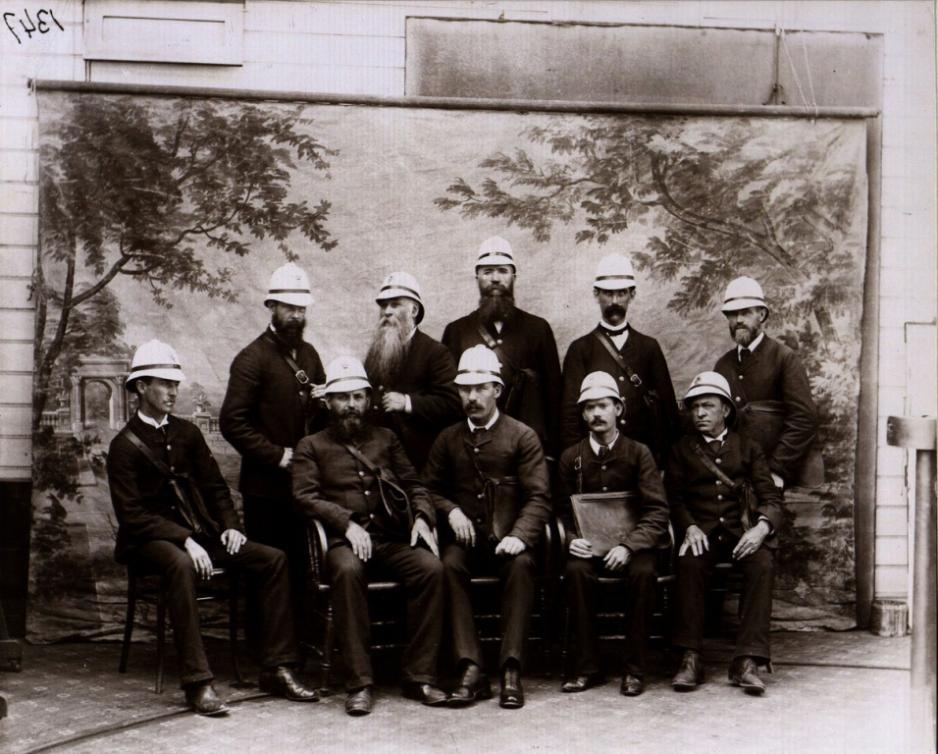
Group of Letter Carriers, Sydney, 1890 - The Photography of John Sharkey, First Official Photographer N.S.W. Government Printing Office 1869-1896, Image 1347, courtesy Royal Australian Historical Society (RAHS) set on Flickr Commons.
Extras:
A Politician's Joke. PLAYING THE HIGHWAYMAN. An Australian author (says the "Sydney Morning Herald ") made one of her heroes Premier of Queensland, while at the name time he was the chief of a band of bushrangers. Something of this kind once happened in New South Wales. A settler in the Pittwater district was homeward driving a cart laden with 'provisions,' when a man armed with a gun sprang out of the bush and bailed him up. The settler offered all the money he had, but the robber declined to take it, stating that what he wanted was food. Some was given him, and the law-breaker disappeared into the bush. A few months later the same settler went with a deputation to the Postmaster General, to ask for better postal accommodation for his district. They were graciously received, but refused the concession asked for. Thinking that he had met the Postmaster-General before somewhere, the settler remained behind, and inquired of the P.M.G. if he could speak to him privately? The request was granted, and the settler then point-blank, asked the Minister if he was not the man who had robbed him of some food near Pittwater. " Yes,” was the reply, but, for Heaven's sake, don't mention it to others. We were camping out, and as there were no stores about I had to get food for the party somewhere. You can have the postal accommodation."
As this episode occurred in the late sixties, and that Postmaster-General has long since died, there can be no harm in giving his name. He was the Hon. Daniel Egan, one of the old school of politicians, who thought nothing of perpetrating a joke like the one narrated. A Politician's Joke. (1905, November 21). Wagga Wagga Advertiser (NSW : 1875 - 1910), p. 4. Retrieved from http://nla.gov.au/nla.news-article104057047
The late Honorable Daniel Egan, Esq , M.P. Postmaster-General of New South Wales.
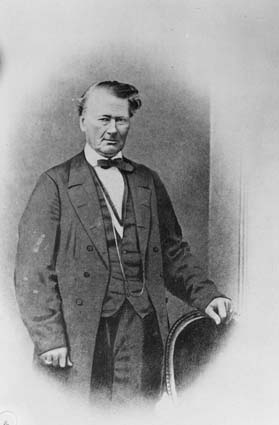 On Sunday last, at 5 p.m., the above-named gentleman expired at the
Oxford Hotel, South Head (where he was temporarily staying), after an illness of
a few hours duration, from effusion on the brain. Mr Egan was in his 67th year,
and on the preceding evening had retired to rest in his apparently usual good
health. About 11p.m. he was discovered by the landlady lying on his bed in a
state of insensibility, and information was immediately dispatched to the Hon.
John Robertson, who at once telegraphed for Dr. Alfred Roberts, the medical
attendant of tho deceased. On that gentleman's arrival, he pronounced the case
hopeless, and His Grace the Most Reverend Archbishop Polding, accompanied by the
Rev. John Dwyer, was as speedily as possible in attendance, and administered the
last rites of the Church to which the deceased belonged. He died in the presence
of the Hon. John Robertson, M.P., MrT. Garrett, M.P., Mr Charles Cowper, W.P.M.,
Dr. Egan, and Mr E. O. Cracknell.
On Sunday last, at 5 p.m., the above-named gentleman expired at the
Oxford Hotel, South Head (where he was temporarily staying), after an illness of
a few hours duration, from effusion on the brain. Mr Egan was in his 67th year,
and on the preceding evening had retired to rest in his apparently usual good
health. About 11p.m. he was discovered by the landlady lying on his bed in a
state of insensibility, and information was immediately dispatched to the Hon.
John Robertson, who at once telegraphed for Dr. Alfred Roberts, the medical
attendant of tho deceased. On that gentleman's arrival, he pronounced the case
hopeless, and His Grace the Most Reverend Archbishop Polding, accompanied by the
Rev. John Dwyer, was as speedily as possible in attendance, and administered the
last rites of the Church to which the deceased belonged. He died in the presence
of the Hon. John Robertson, M.P., MrT. Garrett, M.P., Mr Charles Cowper, W.P.M.,
Dr. Egan, and Mr E. O. Cracknell.
Mr Egan was a native of the colony, and in early life was master of the dockyard in this city, and when that ceased to be an Imperial establishment here, he was offered a similar appointment in the Imperial dockyard at Trincomalee. He took an active interest in civic
matters, and was elected by the citizens Mayor of Sydney in 1851. In the year 1853 or 1854, Mr Egan was elected to represent the pastoral district of Maneroo in the old Legislative Council ; and, on the inauguration of Responsible Government, in 1856, he took his seat in the Legislative Assembly on the 22nd of May of that year as member for Eden. Mr Egan continued to represent that constituency in every Parliament up to the present; when having been defeated by Mr Clarke, he was returned by the electors of Monaro. When Mr Robertson formed his Administration on the 26th of
October, 1863, Mr Egan accepted a seat in the Cabinet as Postmaster-General, which office he held until the time of his death. Mr Egan had, we believe, no immediate relatives in the colony. It may be remembered that Mrs Egan and some members of the deceased gentleman's family were passengers by-that ill-fated ship the Dunbar, which, on the 20th August, 1857, foundered within, we might almost say, a stone's throw of the hotel where Mr Egan expired.
The remains of the late much lamented gentleman were attended to the grave in the Catholic Cemetery, Petersham, on Tuesday morning by the members of the Govornment and the two Houses of Parliament, the heads of the various branches of the civil service, and a large number, of old friends and colonists. The carriages of His Excellency the Governor and of His Grace Archbishop Polding joined in the procession-which numbered about eighty vehicles. The funeral ceremonies at the grave were performed according to the ritual of the Catholic Church by tho Rev. Father Quinn.
In the Assembly on Tuesday afternoon the Premier moved the adjournment of the House as a mark of respect to the memory of the deceased, which, being seconded by the Hon. J. B. Wilson, was carried, and the House adjourned till the following day. The late Honorable Daniel Egan, Esq., M. P. Postmaster-General of New South Wales. (1870, October 22). Bell’s Life in Sydney and Sporting Chronicle (NSW : 1860 - 1870), p. 3. Retrieved from http://nla.gov.au/nla.news-article65472956
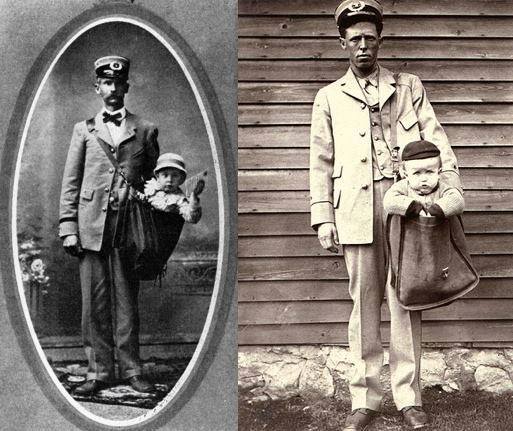 In 1913 in the USA it was legal to mail children. With stamps
attached to their clothing, children rode trains to their destinations,
accompanied by letter carriers. One newspaper reported it cost fifty-three cents
for parents to mail their daughter to her grandparents for a family visit. As
news stories and photos popped up around the country, it didn't take long to get
a law on the books making it illegal to send children through the
mail.
In 1913 in the USA it was legal to mail children. With stamps
attached to their clothing, children rode trains to their destinations,
accompanied by letter carriers. One newspaper reported it cost fifty-three cents
for parents to mail their daughter to her grandparents for a family visit. As
news stories and photos popped up around the country, it didn't take long to get
a law on the books making it illegal to send children through the
mail.
If you peruse early newspapers, albeit younger then when our early settlers first won themselves a mail service, you will find a list of ‘letters held’ or ‘unclaimed letters’ at the central Post Office in Sydney, some of them for people in Pittwater, some of them from people in Pittwater:
UNCLAIMED LETTERS. Jenkins Mr. Wm. Pittwater ; UNCLAIMED LETTERS. (1845, June 7). The Sydney Morning Herald (NSW : 1842 - 1954), p. 2. Retrieved from http://nla.gov.au/nla.news-article12880117
UNCLAIMED LETTERS. Michael or Thomas Farrell, Mr John Farrell; Pittwater UNCLAIMED LETTERS. (1847, April 10). The Sydney Morning Herald (NSW : 1842 - 1954), p. 2. Retrieved from http://nla.gov.au/nla.news-article12893400
In Fact, publishing a Notice in a newspaper, for both legal requirements as much as inadequate delivery addresses, was a method used by our early settlers:
THIS IS TO GIVE NOTICE to Daniel Farrell, of Sydney, or whomsoever the undermentioned cattle belong to, that unless they are removed from my farm at Pittwater within twenty-one days from this date, they will be sold at the next public pound to defray expenses :- One white bullock, branded S on the hip; one brown poley bullock, branded TS on the hip; one snail-horned red bull, unbranded ;one strawberry steer, unbranded. DAVID FOLEY. May 14. Advertising. (1847, May 18). The Sydney Morning Herald (NSW : 1842 - 1954), p. 1. Retrieved from http://nla.gov.au/nla.news-article12892093
EARLY MANLY. Mr. A. Smith lectured to the members of the Manly and Pittwater Historical Society at the Manly Art Gallery on the early days of "the village," Mr. Smith said he remembered helping boatmen to navigate their small craft through the shallow waters that connected the ocean and the harbour. Boulton's bullocks kept Mona Vale supplied with provisions, and Black's coaches carried the mails north to Pittwater, Mr. Cyrus E. Fuller's creamy ponies roamed around one of the town paddocks, and Mr. Lanage's Cows supplied the village with milk. Mr. Smith took part in a match against an English eleven in which Dr. W, G. Grace played. EARLY MANLY. (1935, June 22). The Sydney Morning Herald (NSW : 1842 - 1954), p. 19. Retrieved from http://nla.gov.au/nla.news-article17202937
Mr. CUNNEEN presented a petition from a number of residents of Pittwater in favour of, the early settlement of the Church and School Lands question. The Empire. (1864, January 20). Empire (Sydney, NSW : 1850 - 1875), p. 4. Retrieved from http://nla.gov.au/nla.news-article60581319
It seemed ensuring mail got to Sydney was still more important than getting mail to Pittwater:
A BILL, TO AMEND THE PANAMA ROUTE. POSTAL ACT OF 1858.
... it is expedient to amend the Panama Route Postal Act of 18,58. Be it therefore enacted by the Queen's most Excellent Majesty by and with the consent of the Legislative Council and Legislative Assembly of New South Wales In Parliament assembled and by the authority of the same as follows :
1. The first section of the Panama Route Postal Act of 1858 shall be amended so as to authorise the Governor with the advice of the Executive Council to enter into a treaty with the Imperial
Government whereby this colony shall be bound to contribute _one equal moiety of the whole annual amount which shall be 'agreed to be paid under any contract entered into by the Imperial Government for establishing and maintaining for a period not exceeding years from the date thereof a- regular and expeditious postal communication by steam between Great Britain und this colony by way of Panama.
2. This Act shall be styled and may be cited as the " Panama Route Act of 1860." A BILL TO AMEND THE PANAMA ROUTE POSTAL ACT OF 1858. (1860, October 4). The Sydney Morning Herald (NSW : 1842 - 1954), p. 5. Retrieved from http://nla.gov.au/nla.news-article13046668
A MAN OF MANY ALIASES. Committed for Attempted Horse stealing. At the Parramatta Police Court on Tuesday, before Messrs. J. W. Withers, D. D. Henderson, G. Coates and WV H. Windsor, Jr. P., George Miller, alias Arthur Lloyd, Hope Cunningham, Trafford, Thompson, Cole, Harris, Perry, Young, ? etc., was charged with stealing from Edward Black of Parramatta, one. horse, set of harness, whip, one buggy valued at £23, with intent to steal. Constable Hawthorne, stationed at Petersham, stated that on Monday at 1.45p m. he went to the Parramatta-road Petersham, and there saw the accused who had been trying to dispose of a buggy to a man named Thurjr, under very suspicious circumstances. Asked the accused if the horse belonged to him and he replied' Yes.' Asked him how long he had had it and he said he didn't know.Asked him who ho bought it from and he said he didn't know. He said he had no receipt for it. Arrested him and took him to the Petersham police station and charged him with the offence. He gave a false address. He afterwards admitted he had obtained the horse from Mr. Black,and that if he could have sold it to Mr.Thurjr, he would have taken the boat to Melbourne the next day. Produced the horse and buggy (which were outside the court). Edward Joseph Black deposed that the accused hired a horse and buggy on Monday for two hours. He agreed to pay 5s for the hire. Took the horse and buggy away and did, not see him again till the police communicated with him. Valued the horse and buggy at £20. Gave tho accused no authority to sell tho horse and buggy.John Thurjr, keeper of a livery stable at Petersham, said the accused called on him on Monday, and asked, ' Did you receive a letter from mo 1' Witness replied, 'No.' Asked him what were the contents, and he said, ' Oh, in reference to the selling of this buggy.' Witness said, ' I don't want to buy it.' Accused appeared to be very anxious to get rid of the buggy, and wanted either to sell or exchange it. Witness would not buy, and accused wanted then a loan of £3, and said he would return it '?the next morning with £1 added. Thought the circumstance very suspicious, and said, 'I have no money, but will have some at two o'clock,, if you like to wait.' He said,' It won't be after two, will it ?' Witness said, 'No; probably before.' Witness then telephoned for the police. Accused reserved his defence and was committed for trial at the next Parramatta Quarter Sessions to be held on 29th August. The same accused was further charged that being the bailee of one horse, one sulky and one set of harness, the property of Joseph Black, of Manly, he did convert the same to his own use. Constable Hawthorn gave evidence of arrest similar to that given in the previous case. In reply to the charge accused said he had got the horse and sulky from Mr. Black and had disposed of them. The police asked for a remand to the Water Police Court, in Sydney, on Friday. The remand was granted. A MAN OF MANY ALIASES. (1898, June 22). The Cumberland Argus and Fruitgrowers Advocate (Parramatta, NSW : 1888 - 1950), p. 8. Retrieved from http://nla.gov.au/nla.news-article85836772
The Mail Route to Pittwater and Beyond - threads collected and collated by A J Guesdon, 2014.
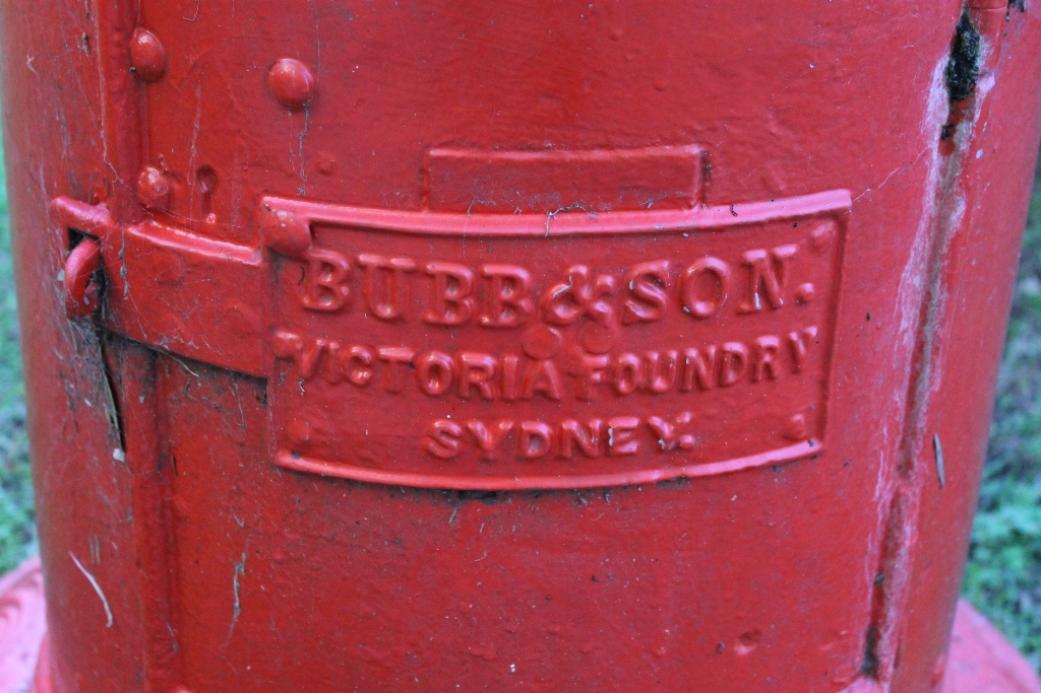
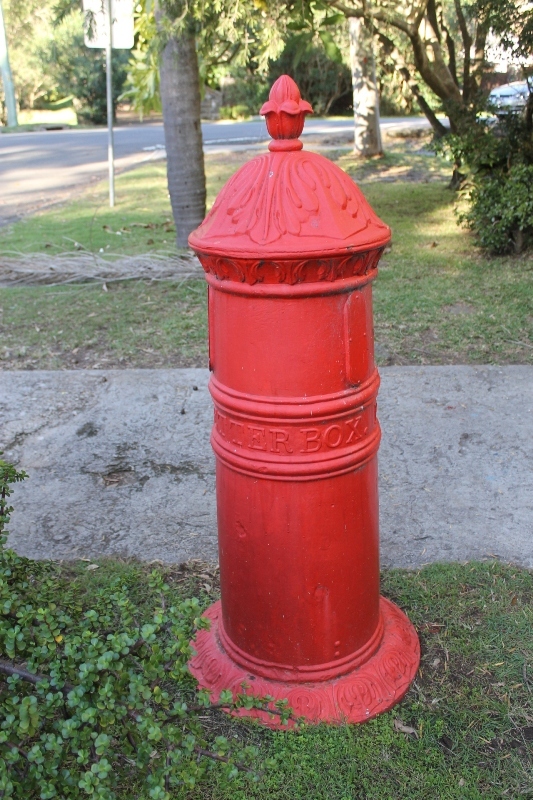
Palm Beach Post Office (now gone) Post Box - photos by A J Guesdon, 2014.
